
STAGES 2022–2023 BOSTON CONSERVATORY AT BERKLEE •
Dear friends,
Since joining Boston Conservatory as interim executive director this summer, I’ve been struck by the incredible breadth of talent, imagination, and innovation housed in this wonderful school. It has been especially gratifying to witness this thriving artistic community in full swing following the challenges of the last three years.
Behind the bustle and activity, there is much work, skill, and commitment that drives the Conservatory’s core educational purpose: empowering young artists with the tools to build meaningful careers. This purpose is manifested each day in the form of teaching excellence. In this special issue, we explore teaching excellence at Boston Conservatory at Berklee through the lens of how our faculty work across the realms of pedagogy and curriculum, research and thought leadership, and performance and professional practice.
Through the thematic sections Coursework, Ideas, Practice, and Outcomes, we examine how, as educators, artists, scholars, and performers, our faculty bring expertise from a diverse cross-section of areas into the classroom, helping students to imagine and forge their own unlimited pathways for professional success.
Enjoy!
Lucinda
 Lucinda Carver Interim Executive Director Boston Conservatory at Berklee
Lucinda Carver Interim Executive Director Boston Conservatory at Berklee

STAGES is published for friends, parents, and alumni of Boston Conservatory at Berklee © 2022.
Editor in Chief: Andrea Di Cocco
Editorial Director: Annette Fantasia
Contributors: Kara Baskin, Annette Fantasia, Susan Gedutis Lindsay, Madison Spahn, Stephen Spinelli, Amanda Wicks
Design: Michelle Parkos
Copyeditor: Sara Arnold Marketing Project Manager: Sarah Valente Digital Content Manager: Ashley Slapo
Boston Conservatory at Berklee 8 Fenway, Boston, MA 02215 617-536-6340
bostonconservatory.berklee.edu
Admissions Information: Boston Conservatory at Berklee Office of Admissions 8 Fenway, Boston, MA 02215 617-912-9153
conservatoryadmissions@berklee.edu
To give a gift to the Annual Fund, visit bostonconservatory.berklee.edu/giving
4 SNAPSHOTS
Boston Conservatory student performers inspire audiences on campus and beyond 6 Q&A
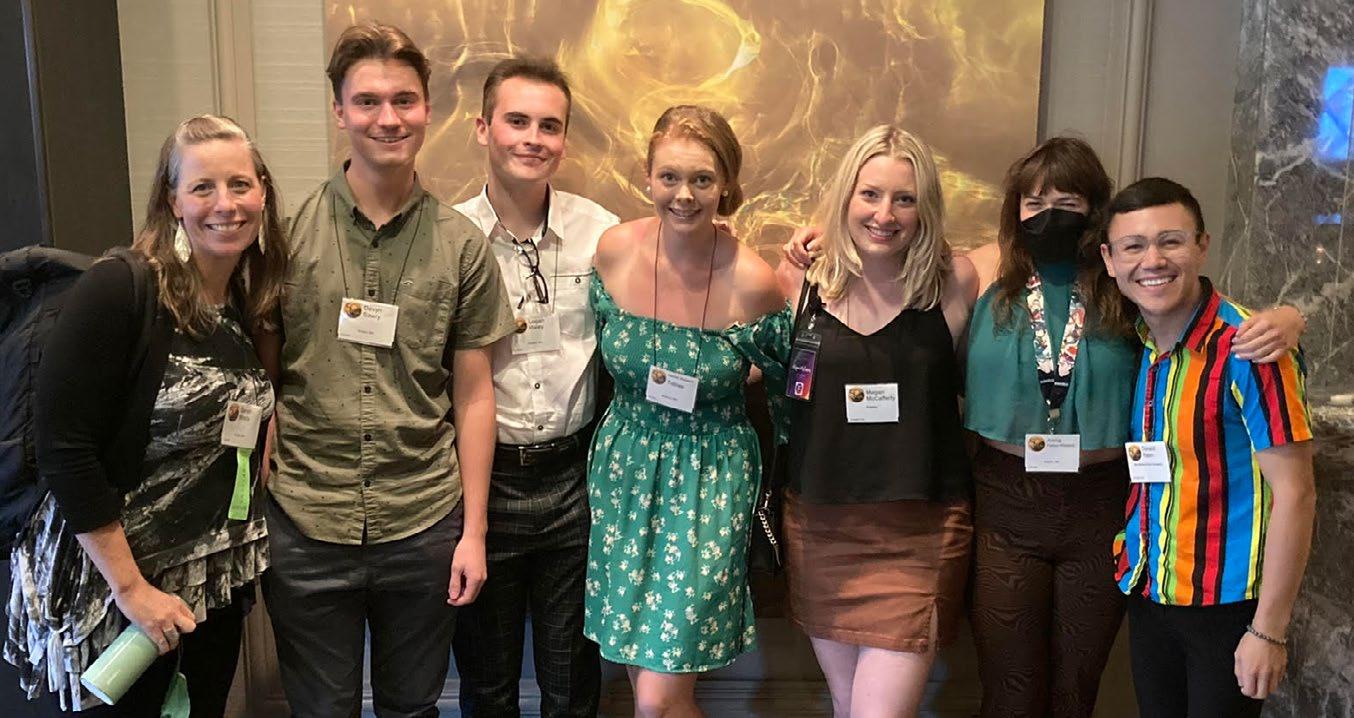
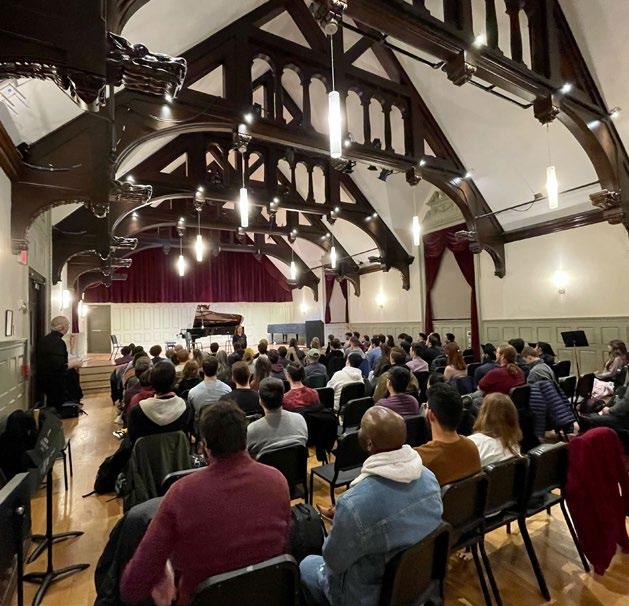

New Chair of Voice Isaí Jess Muñoz discusses his career and his vision for the Voice/Opera Department
COURSEWORK
10 BREAKING GROUND THROUGH MOVEMENT
A look at the new commercial dance program in photos
14 THEATER AS A MIRROR (AND DRIVER) OF SOCIAL CHANGE
How Boston Conservatory’s theater curriculum is evolving with a changing society and industry
18 A CULTURE BEARER IN THE CLASSROOM Faculty member Maya Cunningham brings her ethnomusicology scholarship to the new Music in Context course
IDEAS 20 PUBLICATIONS
Recent books, essays, and collections by Boston Conservatory at Berklee faculty and administrative leaders 22 EXPANDING THE HISTORICAL RECORD Assistant Professor of Voice Stephen Spinelli on the role of research in elevating historically erased musical legacies
PRACTICE
26 THOSE WHO DO, TEACH Boston Conservatory teacher-practitioners share how they bring their real-world expertise into the classroom
OUTCOMES 30 SIGNALING CHANGE AT THE PODIUM Alum Jonathon Heyward makes history as Baltimore Symphony Orchestra’s first music director of color 32 FOR THIS THEATER MAKER, IT TAKES AN ENSEMBLE Alum Shanelle Chloe Villegas reflects on the Conservatory’s contemporary theater faculty and collective collaboration 34 FROM THE VOICE STUDIO TO THE RECORDING BOOTH Opera alum Eric Ferring discusses his debut solo album 36 THE MENTOR
Associate Professor of Dance Joy Davis takes on student career development in a new role 38 IN THE LIMELIGHT Recent happenings at Boston Conservatory 40 NOTEWORTHY
Accomplishments of Boston Conservatory alumni, faculty, staff, and students

Snapshots BOSTON CONSERVATORY STUDENT PERFORMERS INSPIRE AUDIENCES ON CAMPUS AND BEYOND
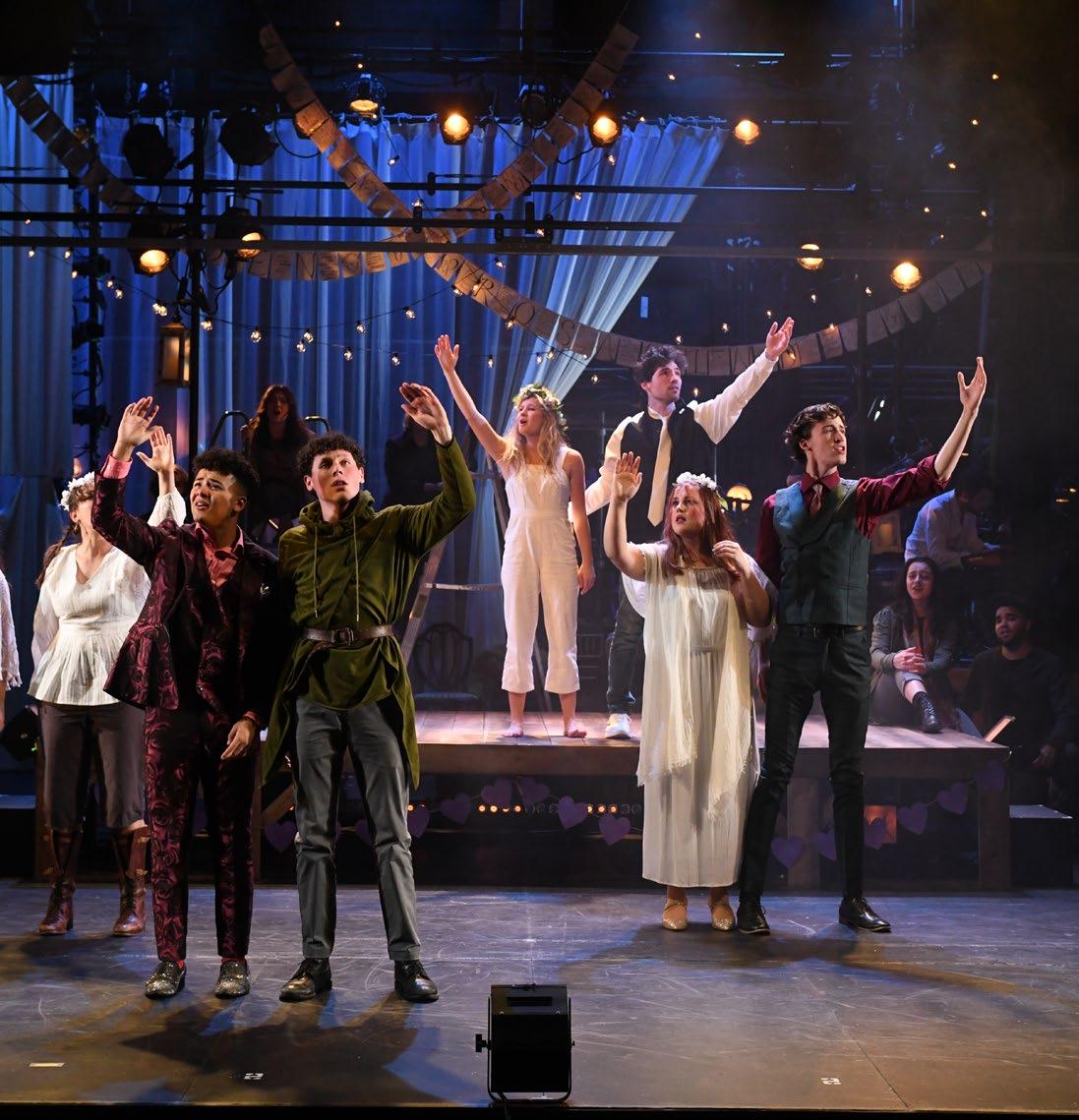
Boston Conservatory students recently delivered powerful performances at both on-campus and off-campus venues, including a special engagement at KCON Los Angeles, in historic spaces such as Old South Church in Boston and Mechanics Hall in Worcester, Massachusetts, and at Calderwood Pavilion at Boston Center for the Arts.

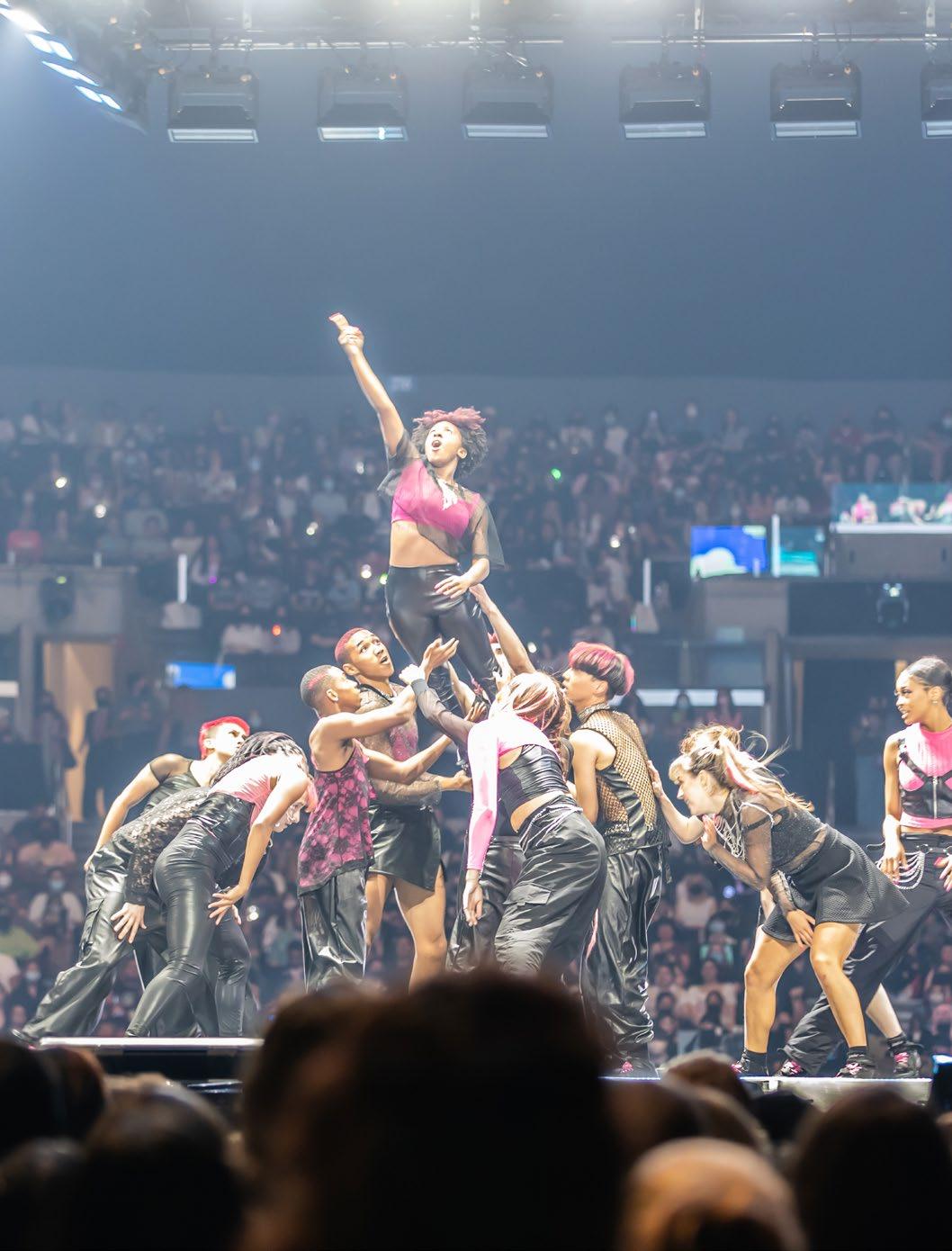 Thirteen Conservatory dance students performed at KCON Los Angeles, the world’s largest convention for Korean culture and music, at the Crypto.com Arena, opening for K-pop headliners ATEEZ, ENHYPEN, INI, and others, August 2022.
Boston Conservatory Orchestra performed works by William Grant Still, Tan Dun, and Gustav Mahler at Mechanics Hall in Worcester, Massachusetts, October 2022.
Thirteen Conservatory dance students performed at KCON Los Angeles, the world’s largest convention for Korean culture and music, at the Crypto.com Arena, opening for K-pop headliners ATEEZ, ENHYPEN, INI, and others, August 2022.
Boston Conservatory Orchestra performed works by William Grant Still, Tan Dun, and Gustav Mahler at Mechanics Hall in Worcester, Massachusetts, October 2022.
4 | STAGES
Musical theater students perform in the Conservatory’s production of a contemporary adaptation of Shakespeare’s As You Like It, October 2022.
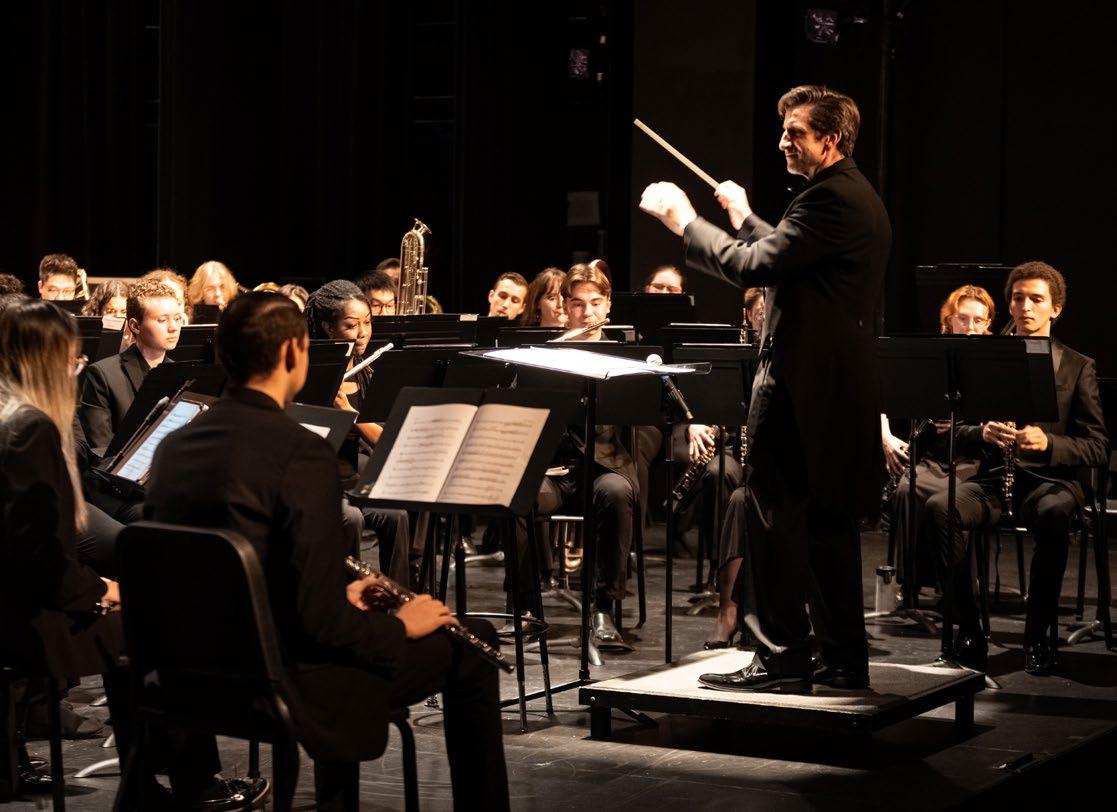

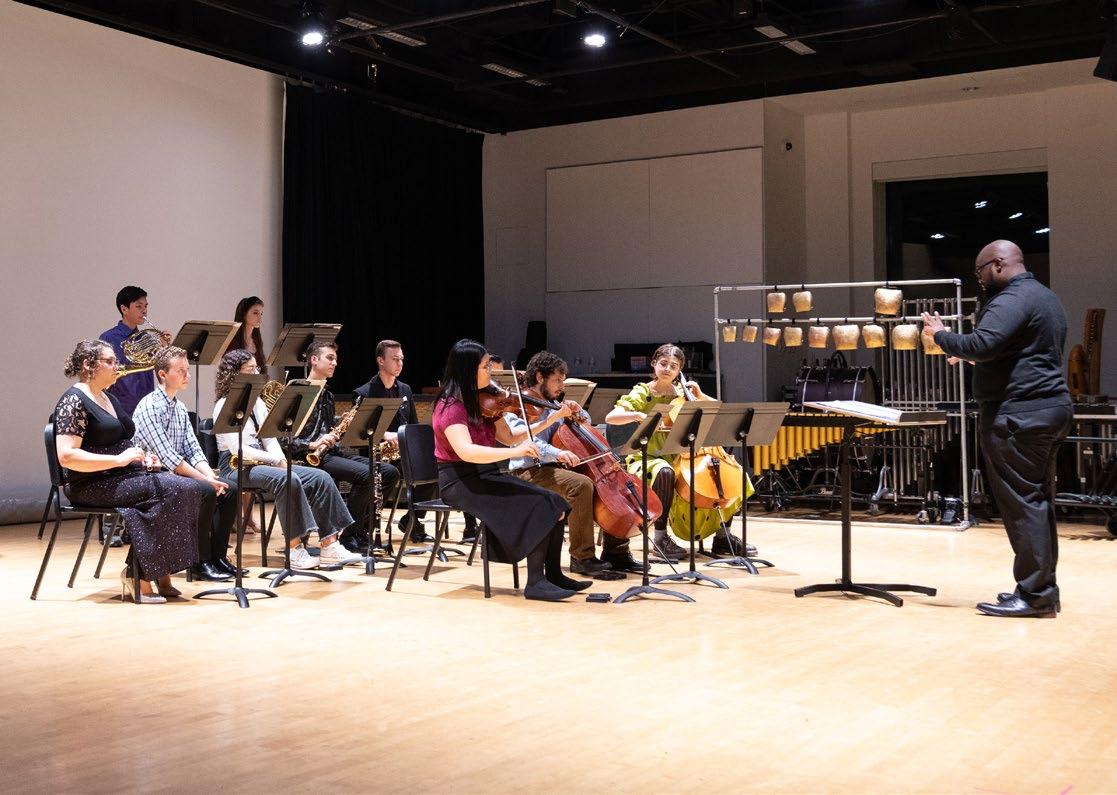
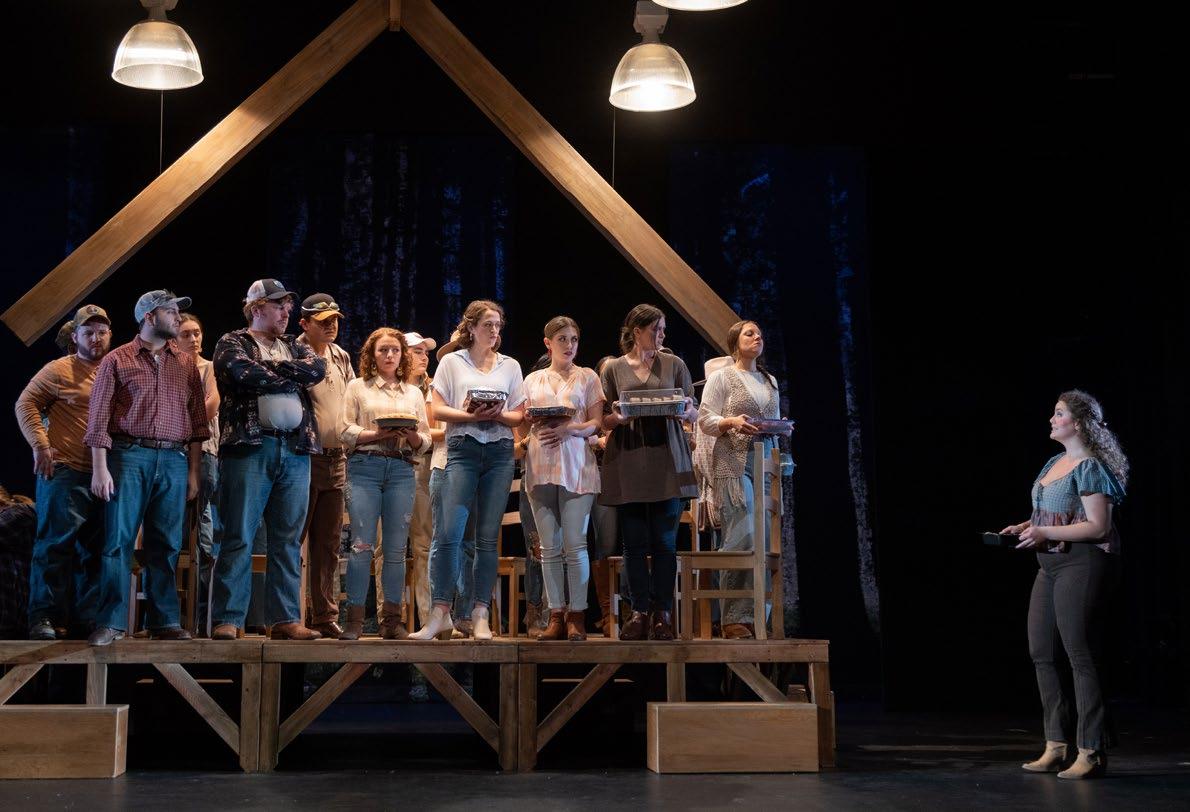

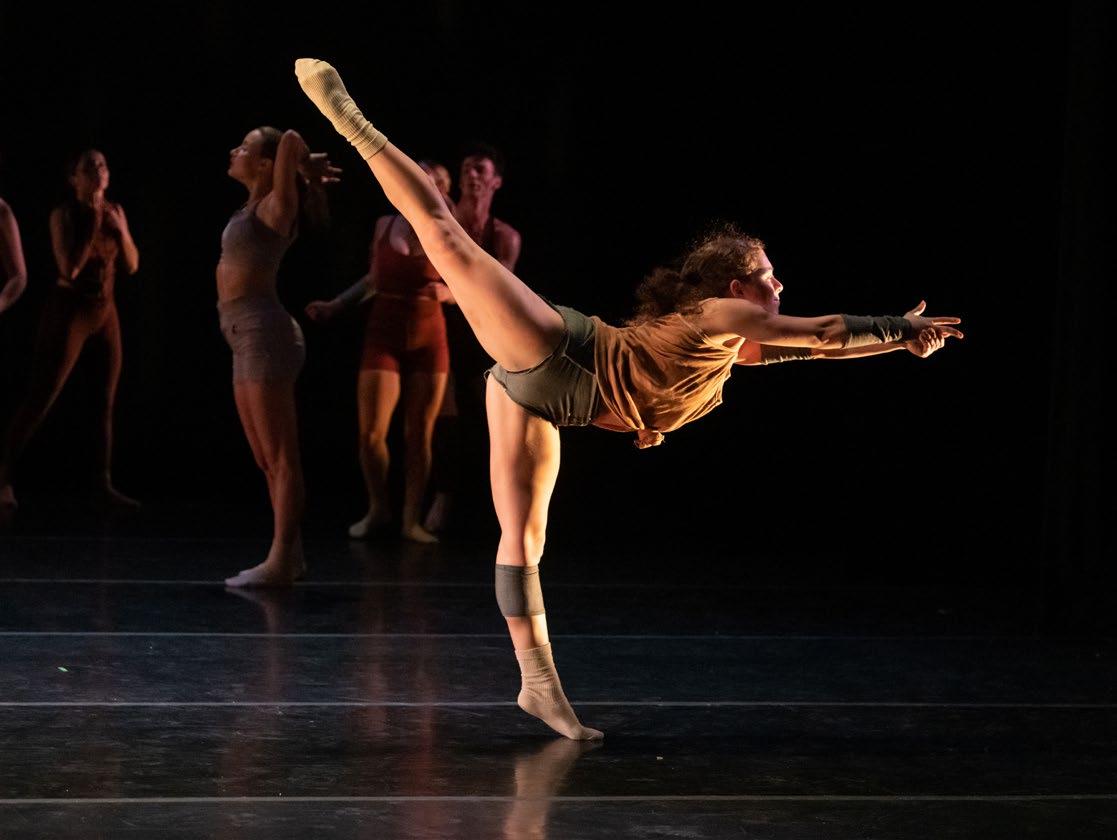 Theater students performed Swing!, featuring classic and contemporary arrangements of some of the most well-known songs from the jazz era, at Calderwood Pavilion at Boston Center for the Arts, December 2022.
Opera students presented the award-winning opera Susannah, December 2022.
Boston Conservatory chorus and orchestra welcomed Met Opera soprano and guest soloist Karen Slack for the New England premiere of Florence Price's Song of Hope, held at Boston’s Old South Church, December 2022.
Dance students perform in the Conservatory’s Fall Dance Concert: From the Ground Up, November 2022.
Boston Conservatory at Berklee's contemporary music ensemble, contraBAND, performed minimalist works by Philip Glass, November 2022.
Theater students performed Swing!, featuring classic and contemporary arrangements of some of the most well-known songs from the jazz era, at Calderwood Pavilion at Boston Center for the Arts, December 2022.
Opera students presented the award-winning opera Susannah, December 2022.
Boston Conservatory chorus and orchestra welcomed Met Opera soprano and guest soloist Karen Slack for the New England premiere of Florence Price's Song of Hope, held at Boston’s Old South Church, December 2022.
Dance students perform in the Conservatory’s Fall Dance Concert: From the Ground Up, November 2022.
Boston Conservatory at Berklee's contemporary music ensemble, contraBAND, performed minimalist works by Philip Glass, November 2022.
bostonconservatory.berklee.edu | 5
Boston Conservatory Wind Ensemble presented a program called Heavy Metal (and Wood) that fused rock ’n’ roll, heavy metal, funk, and groove with the sounds of the classical wind ensemble, September 2022.
Q&A CHAIR OF VOICE ISAÍ JESS MUÑOZ
Isaí Jess Muñoz joined Boston Conservatory at Berklee in August 2022 as chair of voice, overseeing and supporting faculty and students in the school’s voice, opera, vocal pedagogy, and choral programs and leading curricular change aligned with Boston Conservatory’s Strategic Direction. An acclaimed tenor who has collaborated with some of the world’s leading ensembles, he recently released Visca L’Amor: Catalan Art Songs of the XX and XXI Centuries, which reflects his deep commitment to elevating underrepresented musical voices. Here, Muñoz reflects on the moment in his youth that hooked him on opera, the key mentors who shaped his professional journey, and what excites him most about Boston Conservatory and its Voice Department.
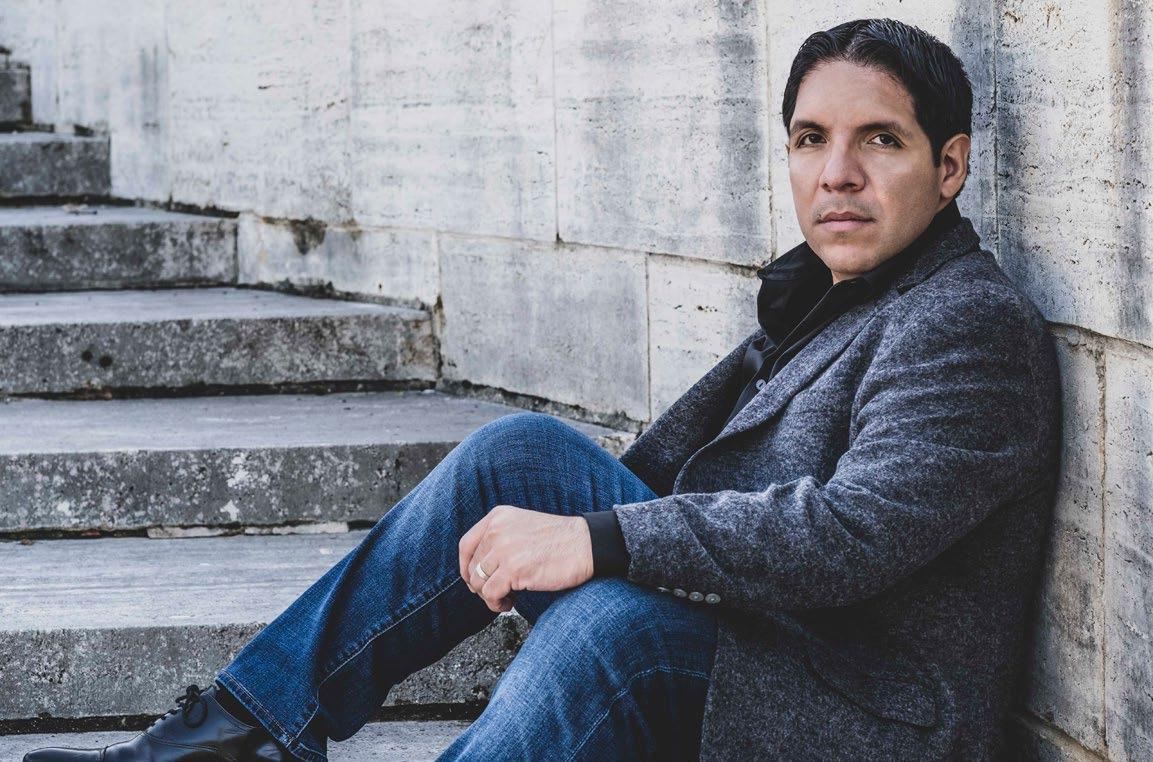
WHEN DID YOU KNOW THAT YOU WANTED TO PURSUE CLASSICAL MUSIC AS A PROFESSION?
I first realized I wanted to pursue formal studies in classical music at an early age. My childhood was filled with a beautiful and rich cultural heritage of tastes and sounds from Latin America, folkloric and popular in scope. It wasn’t until Orlando Opera, a local opera company, visited my grade school that I heard live the ethereal sounds of classical singing. Once I listened to the unmistakable sounds of opera, in the fifth grade to be exact, I was hooked! I ran home to tell my parents that I wanted to be an opera singer. Three months later, I was in my first mainstage opera—Puccini’s Tosca—standing behind Sherrill Milnes’s Scarpia as a child chorister in the opera’s act one finale, “Te Deum.” I stayed on in the youth program of Orlando Opera, which then prepared me for college auditions. The rest of my trajectory is simply about hard work and people helping people. You can say I’m in large part a product of arts outreach programs, which is something that I do my best to advocate for in my role today as an artist and educator. You never know who’s sitting out there in the audience, whose life you’re changing.
TALK ABOUT SOME OF THE KEY MENTORS WHO WERE PIVOTAL ALONG YOUR CAREER PATH. WHAT DID YOU LEARN FROM THEM?
My first voice teacher and closest mentor for nearly 25 years was the late Richard Owens. He was a true pioneer who founded the American Institute of Musical Studies (known as AIMS) in Graz, Austria, which was the first and now largest program of its kind, originally aimed to train American singers in the European system. Professor Owens changed the face of training for performers, and though there is more I could say in recognizing his artistry and visionary prowess, perhaps the most important thing to point out is the high moral character he maintained in all his interactions. I learned so much from my studies with him, and later from assisting him with the building of training models that have now been emulated by dozens of universities, conservatories, and professional training programs in America and abroad.
Other mentors include Sylvia Plyler, who for many years served on the coaching faculty at Aspen and the University of Cincinnati College-Conservatory, where I studied. I then pursued my master’s degree at the Manhattan School of Music, where Gordon Ostrowski (dean of opera emeritus) introduced me to the National Opera Association (NOA), leaving an indelible impact on my life. I’m honored to currently serve as NOA’s president-elect, where I get to continue the legacy passed on by some of my mentors, which involves regularly curating and producing performances and lectures for national conferences and centers for music and learning. Every day, getting to disseminate not only my own work but also the work of my peers for the betterment of communities is something that fills me with great joy. It also leaves me with a deep sense of gratitude to know that music in many ways chose me.
6 | STAGES
IN YOUR SINGING CAREER, YOU HAVE A CLEAR PASSION FOR PERFORMING WORKS BY UNDERREPRESENTED PEOPLES AND CULTURES. WHAT DRAWS YOU TO THIS WORK?
One of the pervasive challenges in higher music education is that still today, very little scholarly attention is devoted to the history and analysis of music outside North American and Central European music (from which Spain is also regularly excluded).
Early in my career, I performed detailed exploratory fieldwork in Iberian and Latin American classical song. Preliminary research had sent me to Barcelona, where I visited various archives and library collections that led me to engagement with the art songs of Catalonia, the autonomous community in Spain, where the repressive effects of the Spanish Civil War and Francisco Franco’s dictatorial ban on its native language—Catalan—contributed to scarce diffusion of all its literature, including its canon of classical song. I quickly began to explore more underrepresented material often associated with Iberian and Latin American cultures that have been suppressed and marginalized. Each region offers its own distinctive musical voice, rich in abstract harmonies, provocative and intimate and nostalgic. Often, inherent in the music of these cultures is a search for national identity—a yearning that is explored through musical and poetic colors— emerging from the human compulsions to contemplate and to record. My hope is that, beyond the sharing of beautiful music, the narratives covered in my past and future projects, regardless of whether they focus on obscure or well-known material, serve in some way to promote inclusion, awareness, and a positive difference.
WHAT ARE SOME OF YOUR TOP PRIORITIES IN YOUR ROLE AS CHAIR OF VOICE?
One of my primary goals is to continue building upon the Conservatory’s deep commitment to fostering spaces where people feel a sense of belonging—where our community members share purposeful work that promotes a common life together. I’m therefore always thinking of how individual creative ventures relate to our collective body of work. We’re educators and learners in a world of rapid and incalculable change, which has great implications for our efforts to build community in higher education environments.
By leveraging our collective strengths, we will continue finding new and exciting ways to keep the curriculum and offerings relevant. With a faculty of international renown, a stealthy annual lineup of important visiting artists, and a strong commitment to civic engagement and global
initiatives, the department has entered a time where we can now go from strength to strength. I have many ideas, but together the faculty and I will continue building on the rich history of our department that has been mentoring young artists very successfully now for more than 100 years. It’s an incredible legacy.
SO FAR, WHAT HAVE YOU ENJOYED MOST ABOUT BOSTON CONSERVATORY?
We not only teach our students how to sing, act, and dance; we mentor them on how to thrive in an everchanging world and marketplace. Many things are continually changing and always renewing themselves. Every day, Boston Conservatory accomplishes the extraordinary task of meeting the needs of its community and the evolving music industry at large through its very relevant curriculum and the myriad windows of possibility that open on our campus every day.
But beyond all the excellent teaching and networking opportunities at our fingertips, it’s the genuine sense of goodness and familial inspiration felt in our hallways that excites me to come to work every day. There is an ethic of care here at Boston Conservatory that is distinct. We’re championing people’s goals and aspirations in ways where they feel creative, safe, powerful, and courageous. Our students and faculty understand that they have an opportunity to build a life for themselves through the performing arts that has purpose, meaning, and the power to actually change the world.
The music industry branches out beyond entertainment in so many ways—in education, certainly, but also in the health sciences, in technology, and through other avenues. “How can you change the world through your journey in singing and creating?” That’s a question we ask ourselves here continually. Yes, we’re recognized as one of the premier training programs for opera in America, and we’re now leading the way in all things vocal pedagogy. We’re also experimenting with new and existing approaches in ways unlike any other training program in the world. Our choral ensembles and current song literature experiences are at the heart of these kinds of unique explorations. Boston Conservatory is an exciting place to be!
Learn more about the Conservatory’s leading voice and opera programs.
bostonconservatory.berklee.edu | 7

8 | STAGES
The bedrock of Boston Conservatory’s long legacy of innovation is teaching excellence. Here, faculty and administrative leaders are not only educators—they are also the artists, performers, scholars, and culture makers who are actively creating in an evolving performing arts landscape. In this special issue, we explore how teaching excellence at Boston Conservatory manifests as the dynamic interplay of key areas: pedagogy and curriculum, research and thought, and performance and professional practice.
Although these realms overlap and inform each other, this issue examines Boston Conservatory teaching excellence through four thematic sections: Coursework, Ideas, Practice, and Outcomes. We consider how, as artistpractitioners working across these intersecting areas, our faculty connect students to all that is current in the performing arts today. They create vital pathways for students' professional success— and prepare them to be leaders and changemakers in their fields.
bostonconservatory.berklee.edu | 9
BREAKING GROUND THROUGH MOVEMENT
A look at the new commercial dance program in photos
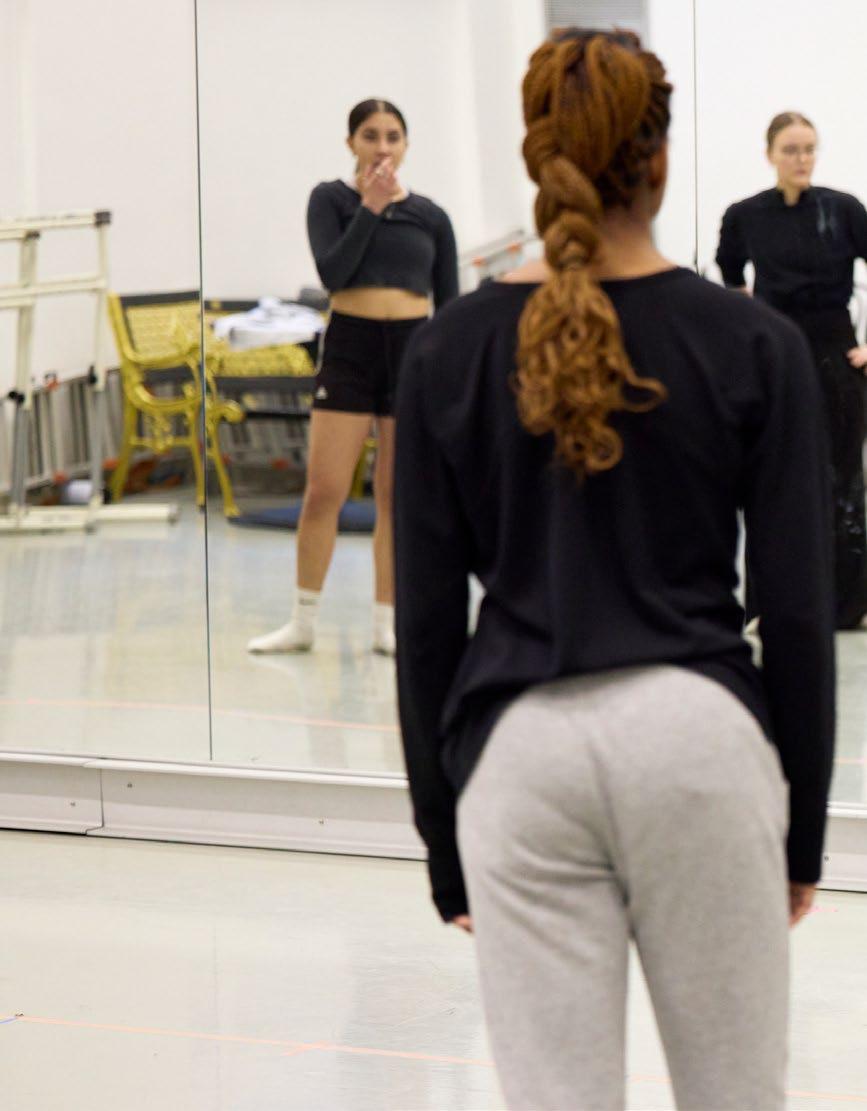
This fall, Boston Conservatory at Berklee kicked off its groundbreaking commercial dance program, the first and only three-year B.F.A. program offered at the conservatory level that is focused on dance performance and creation for commercial industries, including film, television, theater, arena concerts, music videos, and more. Here’s a behind-the-scenes look at some of the classes in the program—taught by leaders in the commercial dance industry.

COURSEWORK 10 | STAGES
Photos on pages 10–11 by Kelly Davidson; photos on pages 12–13 by Stefanie Belnavis
In Heels Dance, students learn how to walk, balance, retain choreography, and gain confidence, all while exploring personal poise and power. The course covers both historical and current trends associated with heels performance in popular culture.
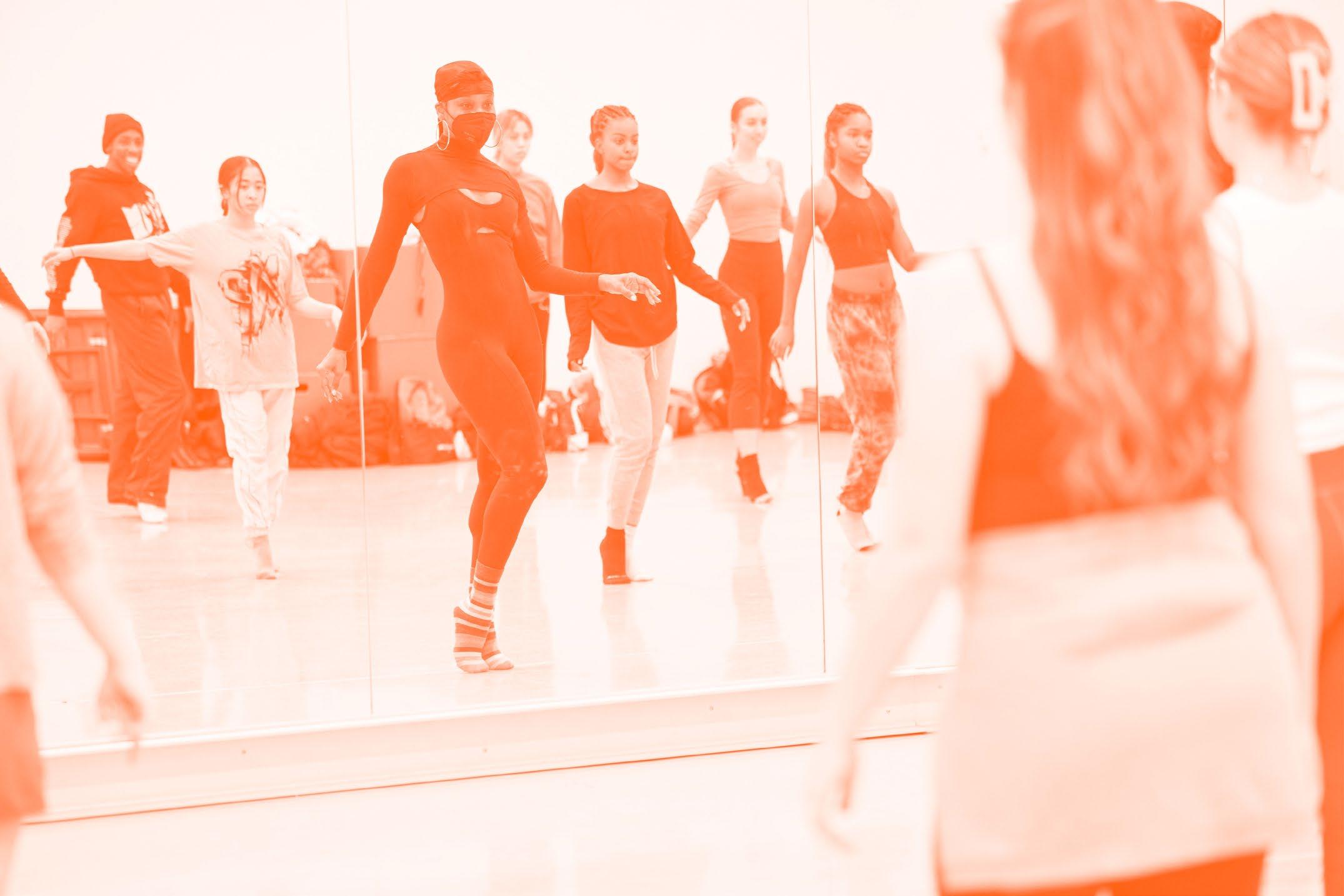
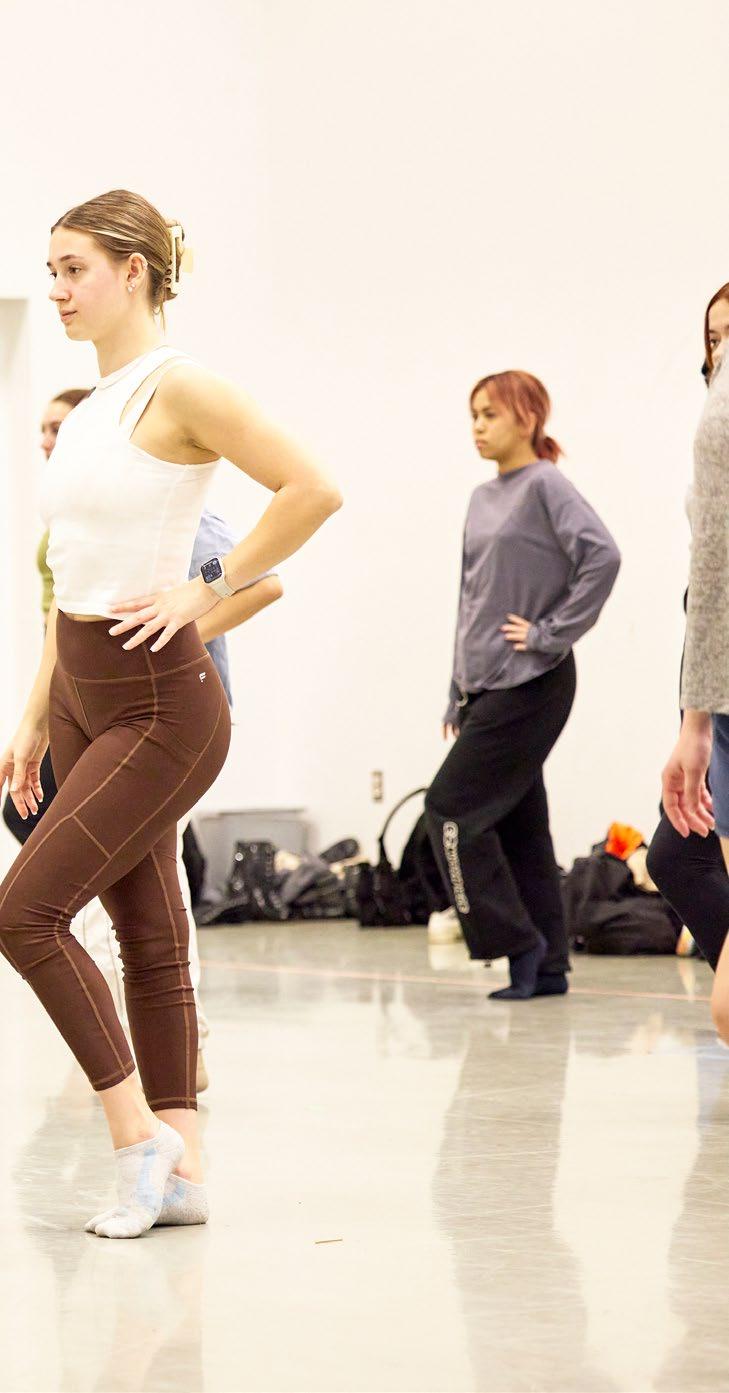
Dance alum Ebony Williams (B.F.A. '05) is a powerhouse in the commercial dance world and beyond. A versatile and in-demand choreographer and performer, she has worked with iconic artists Beyoncé, Alicia Keys, and Doja Cat; on feature films such as In the Heights; on Broadway; and on highprofile campaigns such as the 2021 U.S. Open. As part of a two-week residency funded by the Herb Alpert Visiting Professorship grant, Williams brought her vast industry expertise to a master class for Conservatory commercial dance students.

bostonconservatory.berklee.edu | 11
Raul Cruz’s Commercial Dance Composition and Performance course introduces students to choreographic tools and tactics while they experience the pace of preparing for and building commercial dance performances. They also perform in a wide range of projects throughout the semester that involve live performance, dance for screen and film, dance technology, and cirque-style performance.

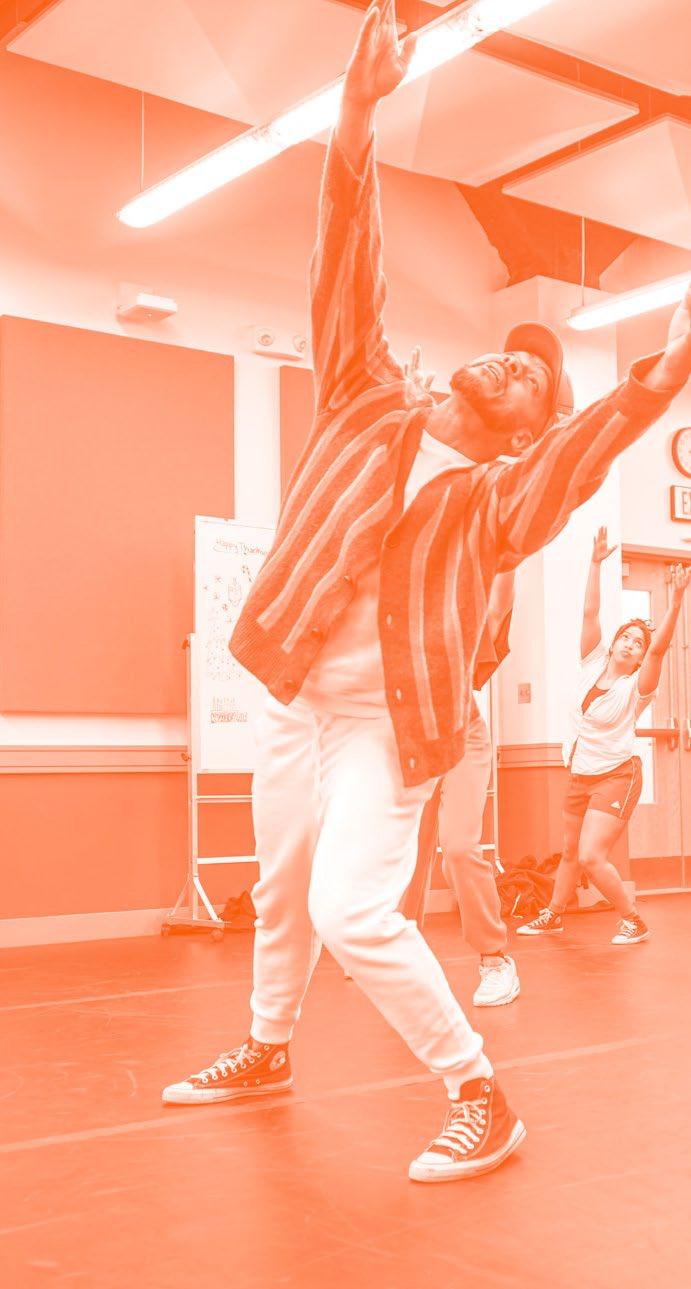
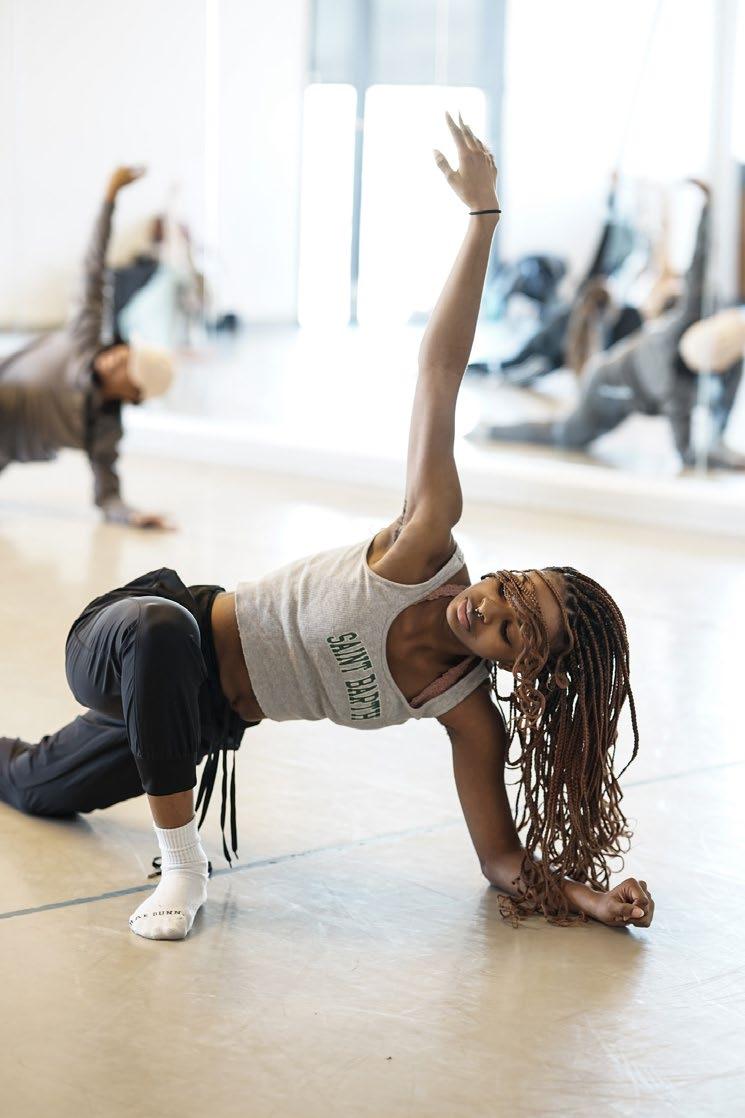
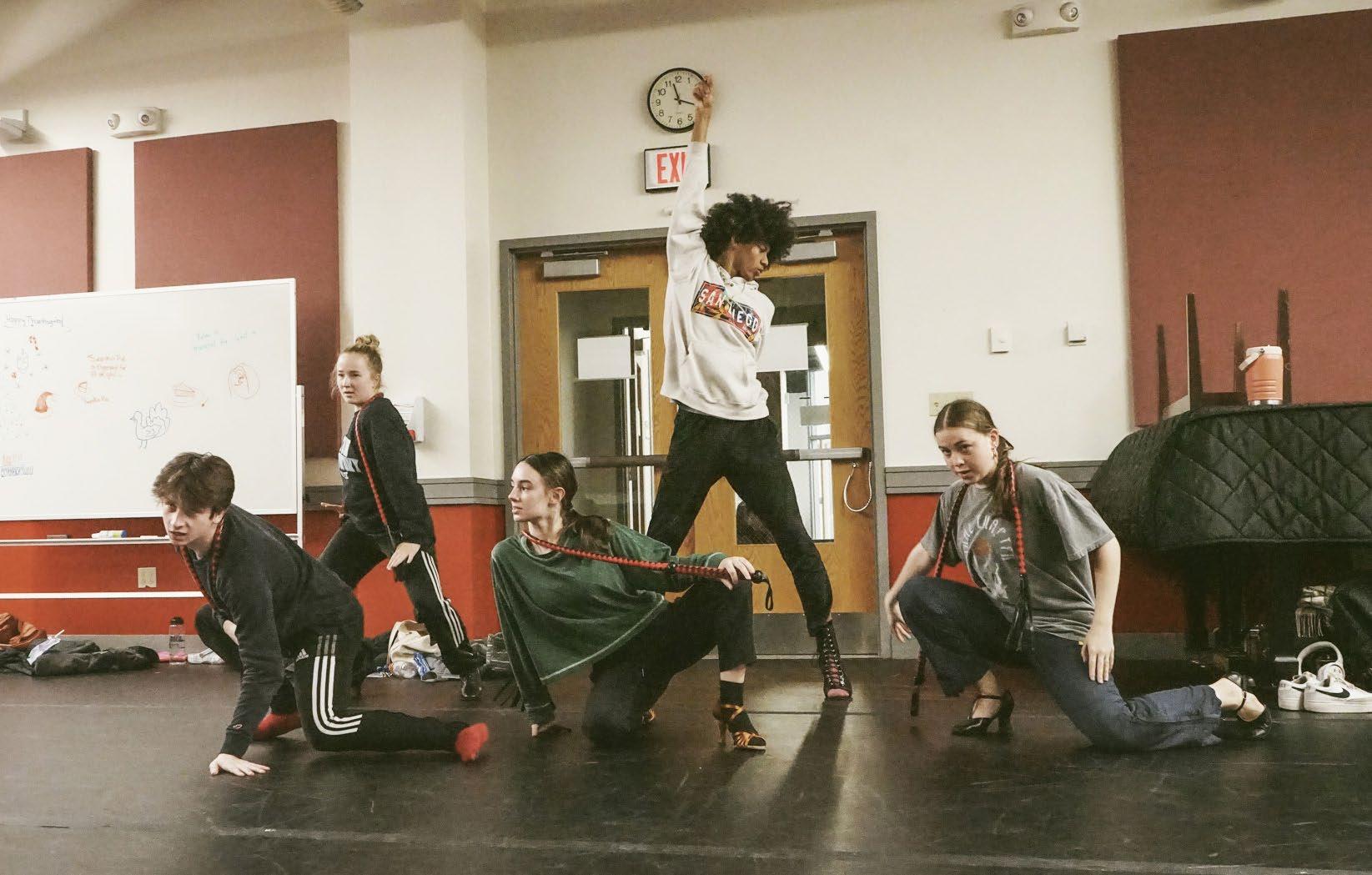
12 | STAGES
In Anthony Burrell’s Pop Diva Dance Repertory course, students learn dance repertoire of pop music divas such as Mariah Carey, Beyoncé, and Rihanna—with whom Burrell has worked directly— and the variety of styles and techniques of tour repertory.


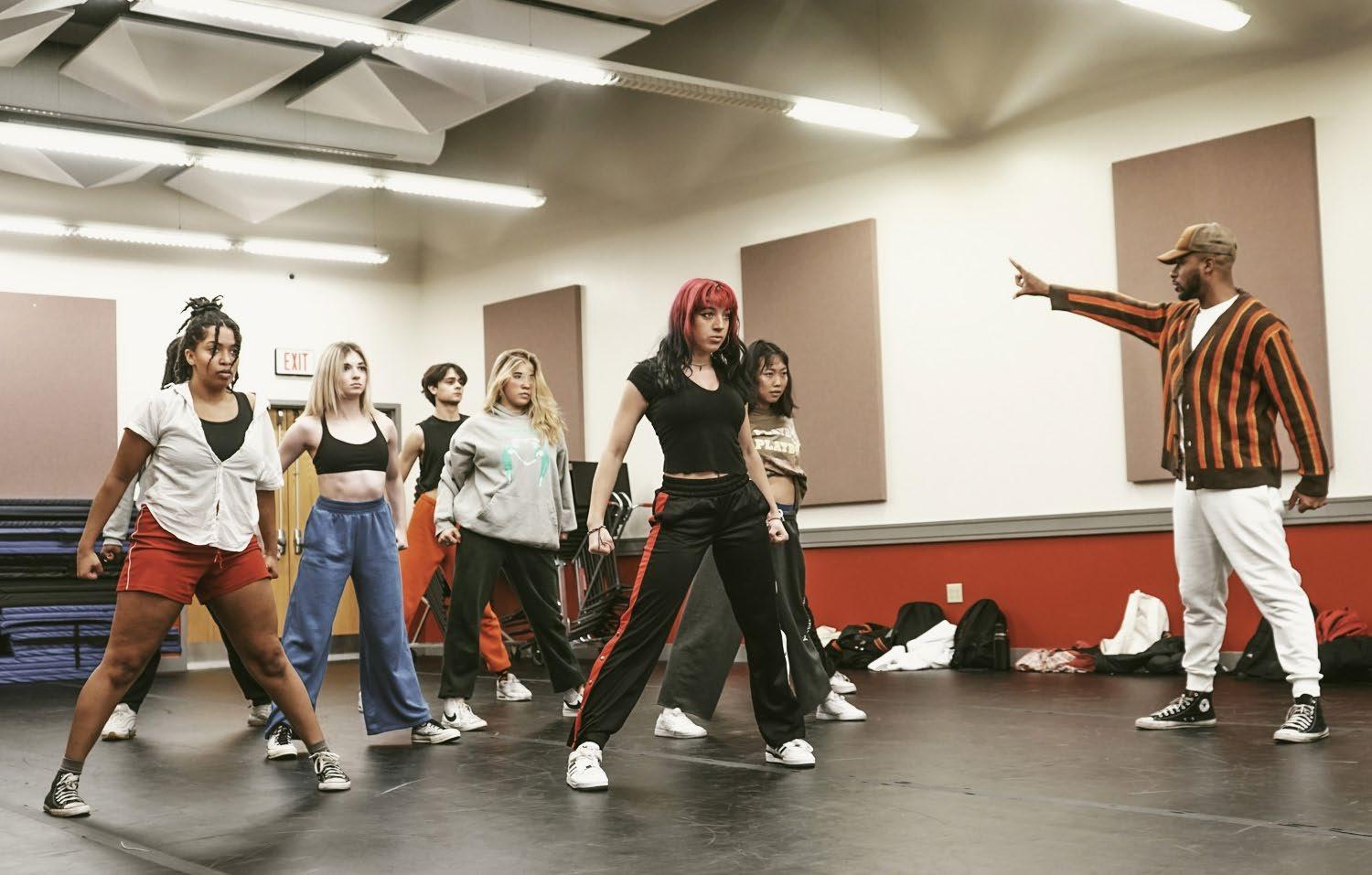
bostonconservatory.berklee.edu | 13
THEATER AS A MIRROR (AND DRIVER) OF SOCIAL CHANGE
How Boston Conservatory’s theater curriculum is evolving with a changing society and industry
 By Kara Baskin
By Kara Baskin
Theater has the capacity to reflect social change and to drive it—and never more so than in recent years, amid the #MeToo movement, the fall of Roe v. Wade, race-driven murders, and political insurrection. These forces have reshaped theater, both as an art form and as a workplace. Boston Conservatory’s Theater Division, too, is evolving with a changing industry and world.
Assistant Professor of Theater Angie Jepson is at the forefront of this reckoning. As an intimacy director, Jepson is an actors’ advocate, ensuring that performances honor both artistry and personal consent—principles that are sometimes in conflict. When is sexual intimacy gratuitous? When is violence necessary to further a plot?
“Across industries, you previously had actors feeling like they had to do whatever their director or costar thought was good in the moment without consent being a part of the process. And that’s harmful,” Jepson says. “We used to think it was fine, because that’s what you do for your craft; that’s what you do as an actor.”
But times have changed. She now teaches musical theater, movement, and stage combat courses that involve working closely with student directors. It’s an intense process in which older students grapple with scripts that incorporate violence or sexual imagery, often with younger peers in key roles.
COURSEWORK 14 | STAGES
ANGIE JEPSON
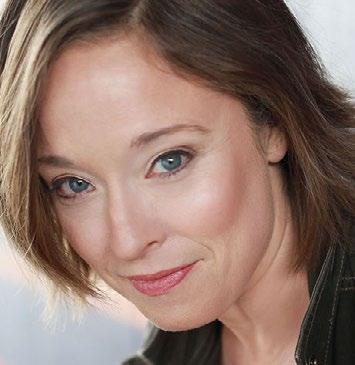
Sensitive to power dynamics, Jepson guides students as they stage intimate or violent scenes, ensuring agreement on boundaries and protocols. “I work with students on consent, structure, and choreography. Choreography is a big part of the work, because it becomes the physical script,” she explains. “If you have choreography, everybody can agree to what’s happening. If we’re improvising movement, it’s hard for folks to consent.”
Jepson also mentors faculty members. She recently helped a dance instructor interact with a student who’d suffered past physical trauma, sharing ways to consent to touch. It’s an emotional but artistically gratifying process, she says. “When a student or an actor isn’t worried about whether they will be touched somewhere they don’t want to be touched—when that’s not even a concern— they’re free to fully dive into their work and give it everything that they have,” explains Jepson. “It’s really fun to see them be bold because they feel safe.”
As Jepson works to ensure that students can bring their authentic selves to the stage, her colleagues are navigating theater’s role as a mirror of the human experience. Angela M. Farr Schiller and Megan Stahl, both associate professors of theater, teach the course Evolutions and Revolutions in Musical Theater. Stahl also teaches Performing the Immigrant Experience.
Their students are pressed to consider classic musicals through a contemporary critical lens, weighing how musical theater—a hugely influential barometer of American culture (consider how many people can recite Hamilton by heart)—should both reflect society and challenge it.
 Photos by Max Wagenblass
Photos by Max Wagenblass
bostonconservatory.berklee.edu | 15
“Choreography is a big part of the work, because it becomes the physical script.”
For Schiller and Stahl, this work is deeply personal. Schiller recently edited The Methuen Drama Book of Trans Plays, which was a finalist in the 2022 Lambda Literary Awards for LGBTQ Anthology. Her syllabi contain at least one play by a trans playwright, which can be an eye-opening realization for students.
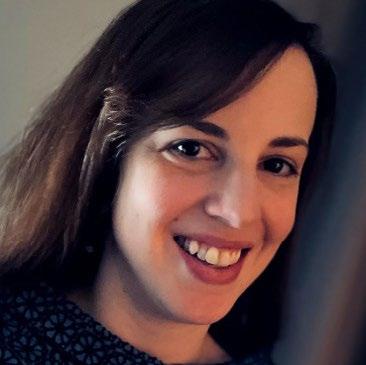
“We just read The Devils Between Us by Sharifa Yasmin. My students said they’d never read a play by a trans playwright, ever,” Schiller says.
Stahl, meanwhile, is deep in collaboration on an anthology of often overlooked plays by MENASA (Middle Eastern, North African, South Asian) female playwrights.
Musicals, both agree, are an ideal vehicle for examining and challenging the status quo: they’re iconic, influential, and uniquely American. While the Evolutions and Revolutions class used to focus on musical theater history, it was intentionally renamed for a broader perspective.
“The musical is really an American invention,” Stahl explains. “But, like a lot of homegrown American institutions, that means its structure is very white, very patriarchal, very heteronormative. And while the world has evolved in many ways, the musical has been a little slower.”
Recently, students in a capstone project were asked to design a summer theater festival in a neighborhood of their choice, such as Roxbury: What would they stage? Why? How could they bridge artists and community? “It’s not just about coming here to get trained and replicate that work out in the field. It’s about: How can I actually use the work that I’m doing in the classroom to think about my art as a contribution to society and to the conversations that are being held in society?” Stahl says.
For all three faculty members, authenticity and autonomy are essential. This, according to Schiller, is the future of theater.
“Students are rising up on college campuses across the nation, saying, ‘We want your intent and impact to be in alignment. We don’t want to just hear more about diversity, equity, and inclusion. We want to see that in our classrooms, in our coursework, in the shows that we’re selecting, and in the faculty members that we have,’” she says.

MEGAN STAHL
ANGELA FARR SCHILLER
“How can I actually use the work that I’m doing in the classroom to think about my art as a contribution to society and to the conversations that are being held in society?”
16 | STAGES
“Students are rising up on college campuses across the nation, saying, ‘We want your intent and impact to be in alignment.’”
SNEAK PEEK: CENTER STAGE SPRING 2023
Boston Conservatory at Berklee’s curated performance series, Center Stage, returns this spring with a stellar lineup you don’t want to miss. Mark your calendars now for these dynamic performances:
INTO THE WOODS March 30–April 2 Music and lyrics by Stephen Sondheim Book by James Lapine
BOSTON CONSERVATORY ORCHESTRA April 8
A concert at Groton Hill Music Center featuring works by Ulysses Kay and RimskyKorsakov and a special performance by 2022–2023 Boston Conservatory at Berklee Student Concerto Competition winner
LE NOZZE DI FIGARO (THE MARRIAGE OF FIGARO) April 13–16 Mozart’s masterful comic opera following the adventures of wily servant Figaro and his beloved Susanna as they unravel numerous complications and foil nefarious plots to prevent their marriage
SPRING DANCE CONCERT: LIMITLESS April 27–30
Featuring monumental works by leading choreographers Bill T. Jones (D-Man in the Waters), Gustavo Sansano (18+1), Doug Varone (The Constant Shift of Pulse), and Aszure Barton (TBD)
NEVER MISS A BEAT: SIGN UP TO RECEIVE OUR BIWEEKLY PERFORMANCE EBLAST
A formal announcement with more details and ticketing information will be made in January. Learn more about Center Stage at bostonconservatory.berklee.edu/center-stage
bostonconservatory.berklee.edu | 17
A CULTURE BEARER IN THE

CLASSROOM
Faculty member Maya Cunningham draws on her ethnomusicology scholarship and performance practice to bring a global perspective to Music in Context, a new music history course required for Boston Conservatory music students.
 By Amanda Wicks
By Amanda Wicks
When vocalist and ethnomusicologist Maya Cunningham was 16, she sang for famed jazz musician Wynton Marsalis. The opportunity came about when Marsalis visited the Duke Ellington School of the Arts in Washington, D.C., where Cunningham was a student. After hearing her sing Wayne Shorter’s “Footprints,” Marsalis gave Cunningham advice that became a fresh wind to guide her sails: “You need to get in touch with the blues.”
She took Marsalis’s note as a challenge: “I started to investigate African American recordings of blues, which led me to early African American recordings in the Smithsonian collection.” Her interest may have been rooted in performance, but the education
she gained flourished in another way. “I was always interested in the academic study of music as well as the performance [of it],” she says. “The two go hand in hand.”
Soon after graduating from Howard University with a B.M. in jazz studies, Cunningham moved to New York City, where she toured and performed with jazz heavyweights, including a performance of Max Roach's Freedom Now Cunningham then began balancing singing with scholarship. She pursued an M.A. in jazz performance, followed by an M.A. in ethnomusicology. She’s now finishing her Ph.D. in African and African American music.
COURSEWORK 18 | STAGES
Photos by Svens Skriveris
Through it all, she’s operated as a culture bearer with a decolonial mission—a role that’s become especially important in the arena of music history. Most recently, she’s carried that torch through her contributions to the design and, now, teaching of Boston Conservatory’s new Music in Context course, which launched in September 2022 as part of the school’s required undergraduate music history sequence.
While music history often traces the art form’s development through a predominantly Western perspective, the Music in Context course disrupts that narrative and incorporates more cultures, traditions, and lineages. Cunningham was a natural fit for the charge.
“Boston Conservatory’s Core Music Studies Department has been working on bringing this course to fruition since 2020,” she explains. Jonathan Bailey Holland, who was then chair of core studies, worked with the department to ideate a broader approach to history. Once that was approved, he invited Cunningham to apply and teach it. “When I came on board, I developed the short summary of what [the course] would be into a full curriculum,” she says.
Cunningham’s background lends itself to the mission of Music in Context. Long before pursuing graduate studies, she taught music to fourth- and fifth-graders. She began encouraging her predominantly African American students to develop a more robust understanding of their musical heritage. “I began to teach them the music of the Mali empire,” she says. The experience also fostered her interest in ethnomusicology.
Since then, Cunningham has found her niche in the overlapping spheres of art and academia. “I’m really committed to an activist ethnomusicology,” she explains. “To be a part of that effort at Boston Conservatory, it’s a quiet activism. It’s the kind that impacts students directly. It helps to shape their thinking and will carry them through the rest of their education.”
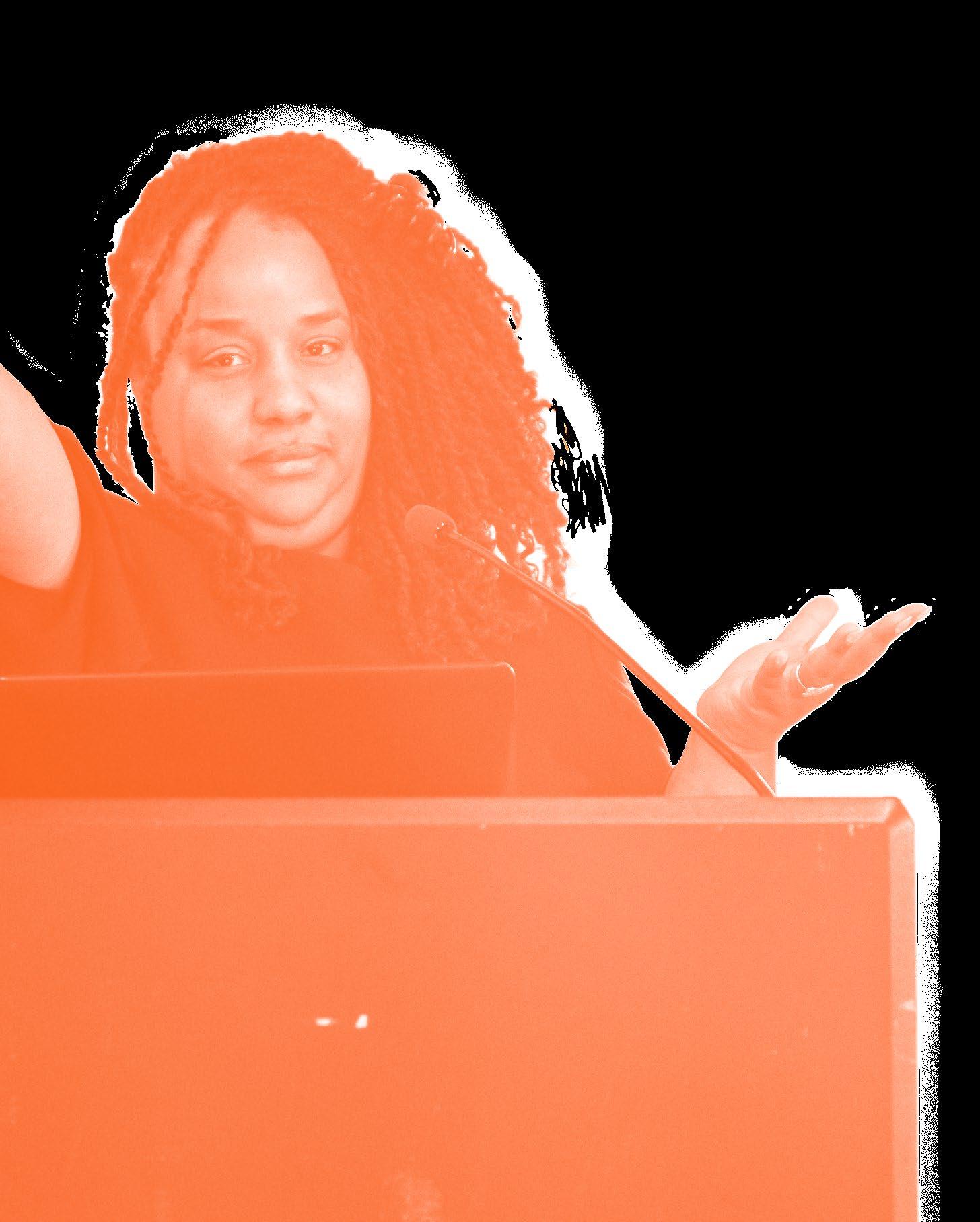
The course has resonated with students. “They seem to be super engaged,” says Cunningham. “Their minds are ready—they’re fertile ground for this kind of construction.” As an academically informed performer teaching performance students, Cunningham has had a unique opportunity to integrate that perspective into the classroom. “I have insider knowledge of many of these traditions, [and I] have spent time with musicians from other traditions that I’m teaching,” she explains.
Cunningham recently invited Amadou Kouyate, who performs Senagalese and Malian music on the kora, to speak with her students via Zoom. His presence resonated beyond the curriculum. “I had one student who wanted to compose a piece for the instrument he plays,” she says, “so they’re engaging with it from the perspective of performance practitioners as well.”
In Cunningham’s hands, Music in Context is an occasion to broaden students’ minds and encourage new culture bearers.
bostonconservatory.berklee.edu | 19
“All of it is really a privilege,” she says.
PUBLICATIONS
Recent books, essays, and collections by Boston Conservatory at Berklee faculty and administrative leaders
David Valdes SPIN ME RIGHT ROUND Bloomsbury Publishing, 2022

Associate Professor of Theater David Valdes, who teaches playwriting for Boston Conservatory’s contemporary theater program, published the novel Spin Me Right Round, about gay teen Luis Gonzalez, who time-travels to his parents’ era to save a closeted classmate’s life. Valdes was invited by the Library of Congress to discuss the work at the 2022 National Book Festival, with a presentation titled “Love Me Like a Love Song: Fresh Takes on Romance.” Spin Me Right Round is listed among the New York Public Library’s Best Books for Teens.
Emmett G. Price III

“IT’S PAST TIME FOR BLACK CURRICULAR INCLUSION”
Oklahoma Eagle, 2022
Berklee’s inaugural dean of Africana studies, Emmett G. Price III, penned the thought piece “It’s Past Time for Black Curricular Inclusion,” published in the Oklahoma Eagle, a Tulsa-based Black-owned newspaper founded following the 1921 Tulsa race massacre. Price’s editorial applauds the long history of student activism that has precipitated advances of Afrodiasporic curricula within higher education. Still, he believes that higher education can do better. “My goal is that we no longer rely on Black death as a catalyst for cultural inclusion and true belonging,” Price writes. “When we strive for academic and performance excellence, and celebrate global influence of Black cultural phenomena in music, theater, and dance, our students are the greatest beneficiaries.”
IDEAS 20 | STAGES
Angela M. Farr Schiller
TROUBLING TRADITIONS: CANONICITY, THEATRE, AND PERFORMANCE IN THE US Routledge, 2022

Associate Professor of Theater Angela M. Farr Schiller, along with Lindsey Mantoan and Matthew Moore, coedited Troubling Traditions: Canonicity, Theatre, and Performance in the US, a conversation among scholars, educators, and artists about how theater and performance studies are grappling with issues of canonicity. Interrogating theater’s fundamental values, the collection reconsiders the discipline’s relationship to its established texts and suggests new ways to expand its inclusion of voices and perspectives.
Aaron Tolson TINY TAP SHOES
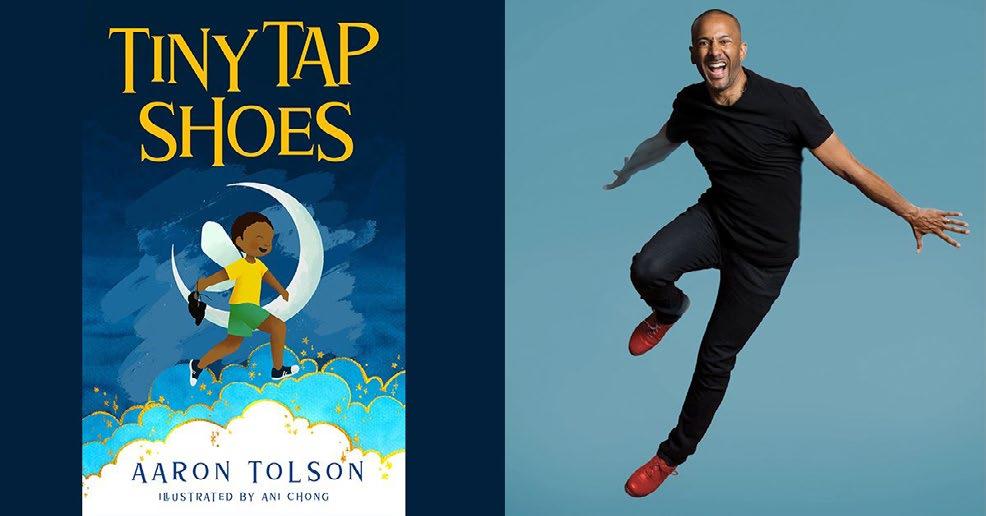
Pegasus Publishing, 2021
Associate Professor of Theater Aaron Tolson’s children’s book Tiny Tap Shoes tells the story of a mischievous fairy named Steve who learns to become a great tap dancer and a great friend all at the same time. The book was inspired by the bedtime stories that Tolson, himself a tap dancer, would tell his own children—but for him, the tap story is also the American story, as he recently told New Hampshire Public Radio: “Tap dancing was born here in America in the fields of slavery, when the Negro Act took away drums people used for communication. They created another way to be percussive and communicate, and that’s where tap dance began. Other cultures see and imitate it, it gets onto the minstrel stages, and then it goes to vaudeville and Broadway. And here we are.”
Jean Anderson
THE YOUNG CLASSICAL SINGER’S TOOLBOX Amazon Kindle, 2022
Associate Professor of Music Jean Anderson’s The Young Classical Singer’s Toolbox prepares young singers for academic and career success. The book provides her characteristic positive and good-humored coaching in music reading, rhythm, and practicing, as well as a step-by-step process for learning a piece of music solidly, easily, and permanently—alongside practical advice for how to maintain sanity in the music world. As Boston Conservatory’s primary opera coach, Anderson has witnessed firsthand that the key to her students’ long-term success is excellent vocal training, solid musical skills, and professional acumen.

bostonconservatory.berklee.edu | 21
EXPANDING THE HISTORICAL RECORD
The history of music is told by a select few who decide what will make its way into textbooks and onto concert programs. As career musicians, we trust that this account is comprehensive. We progress through school, and then— in a state of postdoctoral shock—we run out of degrees and realize we were not provided with the whole story. Five years ago, while I was preparing for a tour meant to investigate the Quaker abolitionist history of Nantucket Island through an exploration of the African American spiritual, a student asked: “Dr. Spinelli, who are the Black women who contributed to our repertory?” Stunned and ashamed that I was only able to offer a few contemporary names, I realized I would need to become my own teacher.
A name kept appearing in my research: Florence B. Price. Price was the first Black woman composer to have a symphony premiered by a major American orchestra,
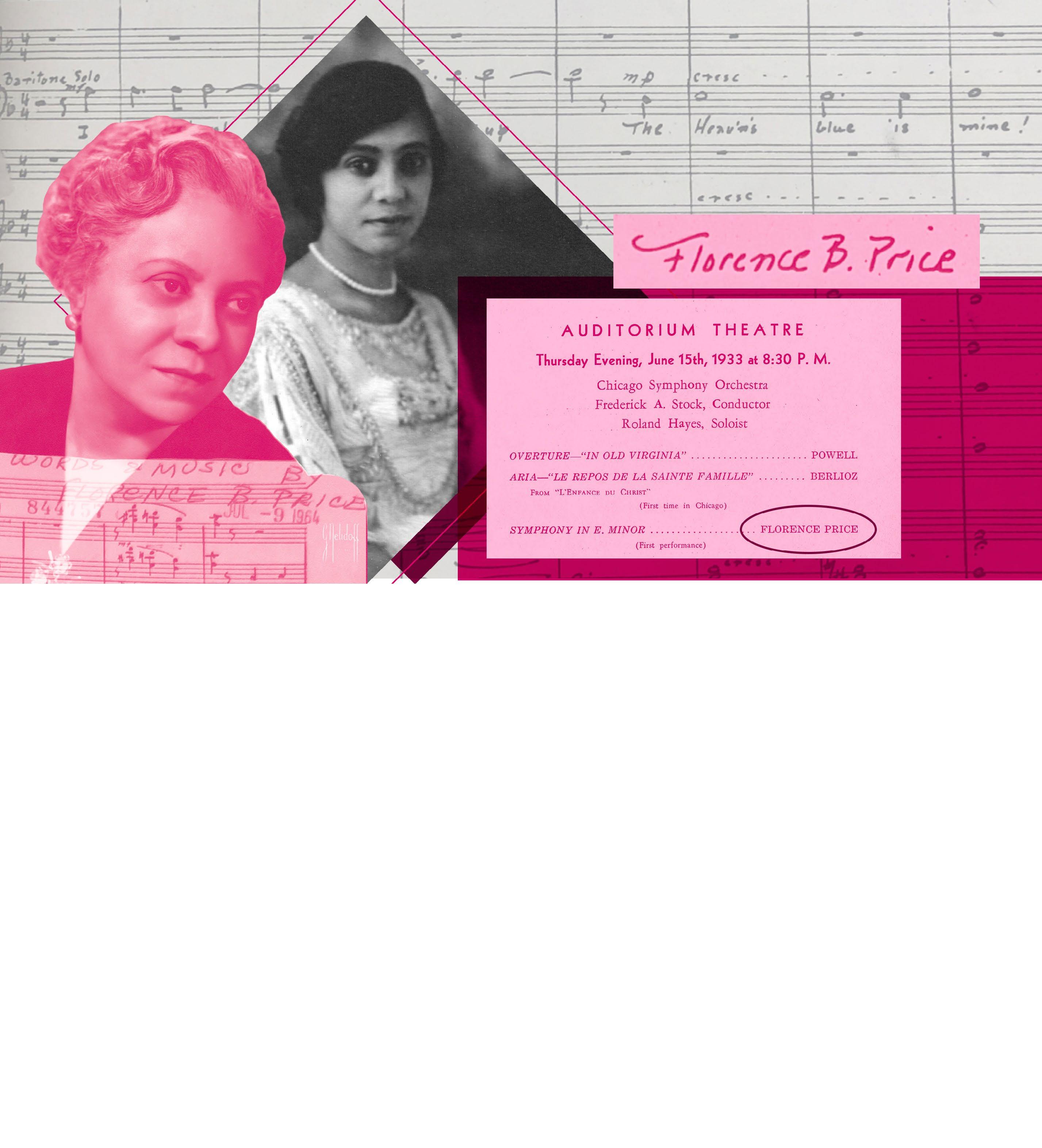
and her prodigious career began at an early age. Shortly after graduating as the valedictorian of her high school class at the age of 14, she attended the New England Conservatory, where she graduated as the only double major in her class, earning a soloist’s diploma in organ and a pedagogy degree in piano. Her accomplishments continued to accumulate as she became chair of the department of music at Clark University and wrote the famous arrangement of “My Soul’s Been Anchored in the Lord” that was sung by Marian Anderson on the steps of the Lincoln Memorial in 1939. She shattered glass ceilings, defied racial barriers, and produced hundreds of compositions, many of which remain unpublished.
Somehow, through my three music degrees and four years serving on the faculty of Cornell University, I was just learning of her phenomenal legacy. These experiences
IDEAS 22 | STAGES
Assistant Professor of Voice Stephen Spinelli reflects on the role of research in elevating historically erased musical legacies.
led me—together with some amazing colleagues—to found ONEcomposer, a nonprofit dedicated to research, performance, and artist support with the goal of elevating historically excluded musical legacies. Price, her music, and her breathtaking legacy serve as a wormhole through which I continue to reckon with the idea of historical erasure.
In my research, I learned of Price’s friend Margaret Bonds, a composer and pianist who was the first Black soloist to appear with the Chicago Symphony Orchestra. Shortly after Bonds’s death in 1972, Zubin Mehta and the Los Angeles Philharmonic played excerpts of her final major work, Credo The parallel history of Black excellence in music is expansive, and archival research—through which we explore correspondence, manuscripts, and other priceless accounts of remarkable musical lives—is a passion of mine.
As a research fellow at Yale’s Beinecke Rare Book & Manuscript Library, I am presently immersed in all things Margaret Bonds: her extensive correspondence and collaborations with Langston Hughes and other leading creatives of the time, as well as photography, concert programs, and manuscripts. This research will yield new editions of previously unpublished work, first-ever recordings, and community engagement and main-stage presentations with major arts organizations such as Opera Philadelphia, the Mann Center, and—most certainly—Boston Conservatory, which has quickly become a passionate partner in this work.
On December 8, 2022, the Boston Conservatory chorus and orchestra presented the New England premiere of Florence Price’s Song of Hope. This work, for which she composed both the music and its text, was written while Price was fleeing the Jim Crow South as part of the Great Migration, only to enter the difficult economic landscape of the Great Depression. Her husband, having lost his job, became an abusive alcoholic, and Price
bravely divorced him just a few years later. In the face of overwhelming societal and personal hardship, Song of Hope—expressing her faith that better times must lie ahead—poured from her pen. Also on the program were unpublished orchestrations of spirituals that Bonds wrote for the great Leontyne Price '19H, performed by guest artist and Metropolitan Opera superstar soprano Karen Slack.
This concert offers a vivid picture of how research impacts music education and manifests in performance programming at Boston Conservatory. Research-based performance brought to life through the hard work and talent of our very own student body contributes to a correction of the historical record and the recollection of incredible legacies that have been excluded for far too long.
 Margaret Bonds performs Florence Price’s Piano Concerto in One Movement with the Chicago Women’s Orchestra, 1934.
Margaret Bonds performs Florence Price’s Piano Concerto in One Movement with the Chicago Women’s Orchestra, 1934.
bostonconservatory.berklee.edu | 23
This research will yield new editions of previously unpublished work, firstever recordings, and community engagement and main-stage presentations with major arts organizations.
By placing excluded excellence alongside welldocumented legacies of musical excellence, it is my sincere hope that we will enable Boston Conservatory students to graduate with a fuller, richer sense of what the musical “canon” could be. Every Boston Conservatory student who participates in choral studies will experience the work of Price, Bonds, William Grant Still, Undine Smith Moore, and as many of the countless remarkable and historically excluded legacies as we can continue to rediscover and include. This work will surely prompt students to program, explore, and seek out erased histories, and herein lies the very hope that Price is summoning in her powerful Song of Hope. Even through the unthinkable circumstances Price faced, and despite the forces of systemic racism that exclude incredible Black legacies like hers, a life steeped in disciplined work, belief in humanity, and the creativity required of a life in music can produce change for the better that echoes through the decades.

“I have been really inspired by singing this work, while alternately feeling frustrated that it’s taken this long for Florence Price’s amazing artistry to be rightfully examined and celebrated. Her story is really reflected in this work, as the text is at times declamatory, at others prayerful and introspective, but ultimately triumphant. As much as we sing the works of composers from the standard repertoire, it’s so important to acknowledge that other people were creating works of beauty and reflecting sides of humanity that are not often represented.”
—Mandy
Matthews, M.M. '24, vocal pedagogy
Stephen Spinelli rehearses with Boston Conservatory chorus ahead of the Song of Hope performance at Boston's Old South Church. Photo by Colgan Johnson.
24 | STAGES
Research-based performance brought to life through the hard work and talent of our very own student body contributes to a correction of the historical record and the recollection of incredible legacies that have been excluded for far too long.

THOSE WHO CAN'T DO, TEACH DANCE
To the misguided character in George Bernard Shaw’s play Man and Superman who famously proclaimed, “Those who can, do; those who can’t, teach”: meet the Boston Conservatory at Berklee faculty. A powerful creative force of “doers,” they are versatile performers and industry professionals who are shaping and moving the currents of dance, music, and theater both locally and around the globe. Here, a sampling of Boston Conservatory teacher-practitioners share how they bring their vast real-world expertise into the classroom—empowering students with the knowledge and sense of artistic identity critical to launching dynamic careers.
Alissa Cardone Associate Professor of Dance
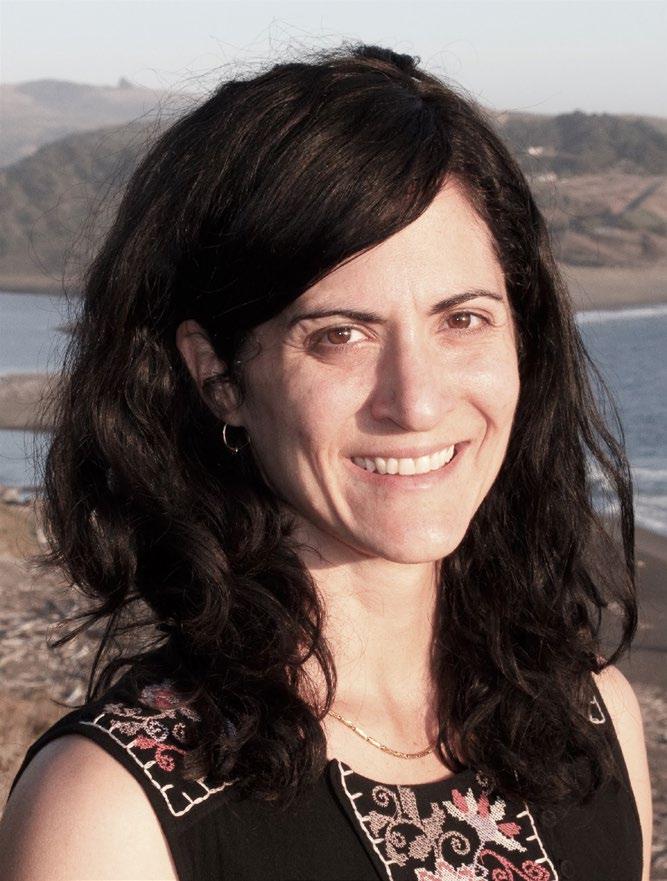
Alissa Cardone teaches her students that collaboration and creative thinking are keys to success for a professional dancer.
“My students will have to be entrepreneurs just like I have been,” she says. “Dance is not a profession with a prescribed path. Everyone has to carve their own. That’s what I’ve had to do and continue to do, and I tend to share the truth with them about that.”
Her most recent work is with the Mobius Artists Group in Cambridge, Massachusetts, a multidisciplinary arts collective creating original work in all media. Cardone encourages her students to look outside of dance for inspiration and ideas, and she continually reminds them that the job that is right for them may not yet exist, so they should invent that job and convince someone to hire them to do it. “That's the work that has purpose and meaning,” she says.
In June 2022, Cardone choreographed the Baroque opera Venus & Adonis by John Blow (composed in 1683) for the Cambridge Chamber Ensemble. She embraced the challenge of crafting contemporary movement for what would have been traditional dance “breaks” that were integral to Baroque operas—for example, sourcing movement from Butoh, a form of Japanese contemporary dance in which she has trained. In another recent project, she collaborated with Boston Conservatory students on a work that included contemporary staging that used the whole space—staircases, balconies, aisles—for the action. “I adore my students,” says Cardone. “For young artists, many of them are so capable and mature. I loved getting to work with them on a real production and seeing them grow in that process.”
PRACTICE 26 | STAGES
Anthony Burrell Associate Professor of Dance
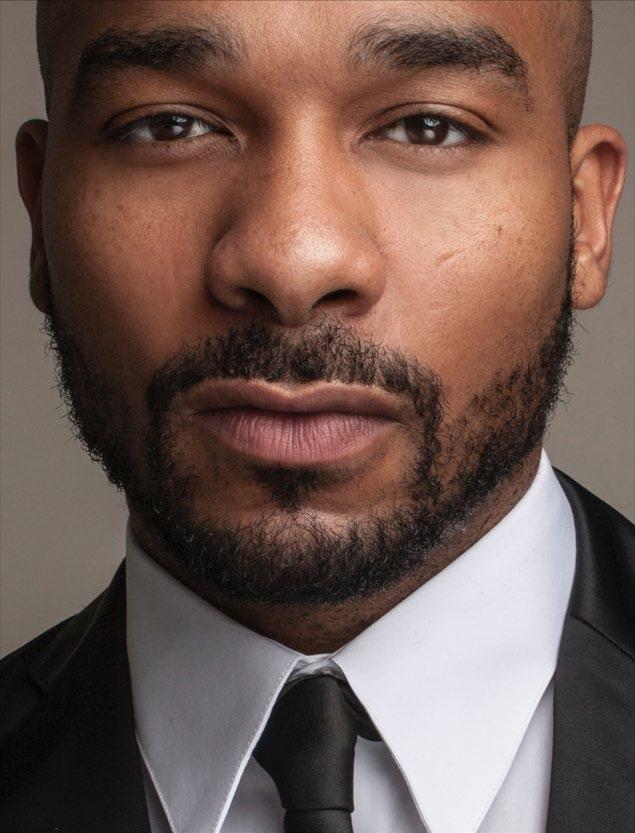
MUSIC
With a versatile background spanning classical and commercial dance worlds, Anthony Burrell teaches in both the contemporary dance and new commercial dance programs at Boston Conservatory. A former member of the venerable Alvin Ailey American Dance Theater, he has also been a creative director and choreographer for a lengthy roster of pop artists, including Beyoncé, Mariah Carey, and Rihanna. Most recently, he took part in the filming of the movie musical The Color Purple, produced by Oprah Winfrey. “I’m excited for this project, not only because it’s one of 2023’s most anticipated films, but because I got to work with some of my favorite actors, singers, and creatives,” he says. “During filming, I knew I was a part of something so special.”
To maintain balance between his performance career and teaching, he chooses his projects carefully. “Every project I do outside of teaching is always a passion field project,” he says. This includes a recent role mentoring BIPOC youth in underserved Boston communities. He finds inspiration in the raw talent and promise of these students as well as those at Boston Conservatory, where his fundamental message to his dance students is preparation:
“Be
ready for any and every extension that your craft may invite.”
Burrell urges students to build as much knowledge as they can from the styles, techniques, and background of the clients, choreographers, and directors of every production they audition for. “Always work smarter and harder than you did the day before,” he tells his students. “This dedication, determination, and discipline will sustain your career and maintain your love and respect for what you do.”
Rhonda Rider Professor of Cello
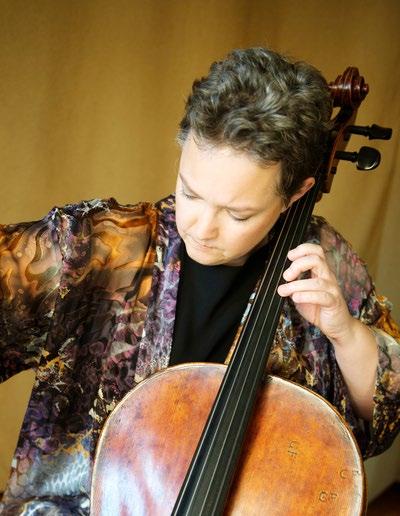
Rhonda Rider’s busy 40-year concert career has included performances in both traditional and nontraditional environments, including more than two decades with the Naumburg Award–winning Lydian String Quartet and Triple Helix Piano Trio. She uses her extensive performance experience to open her students’ minds and sharpen their musical instincts.
A Grammy-nominated recording artist with Critics Choice Awards in both the New York Times and the Boston Globe, Rider recognizes that recording skills are critical to a dynamic career. She recently brought BoCoCelli, the Conservatory’s student cello octet, to the storied Power Station at BerkleeNYC, where they recorded a groundbreaking 360-degree video of student and professional works, including a commission by Navajo composer Michael Begay. “Having students spend the day working in this historic space with extraordinary recording engineers was a dream,” Rider says. Soon after, she traveled to New Mexico to perform with pianist Judith Gordon in a live music program for Chatter, a popular regional organization that aims to revolutionize the audience experience of high-caliber classical music by bringing it out of the formal concert space and into a more intimate cabaret environment.
Such travel can be demanding, but it also helps Rider’s students learn that a performing musician’s schedule needs to be fluid and dynamic. Indeed, Rider offers her students practical and professional advice that can only be learned in live performance. “I’m able to tell a student firsthand how to pace themselves in a Shostakovich concerto, what to listen for in a Brahms quartet, or how to perform an extended technique in new music,” she explains. That balance of artistic vision, practicality, and openness to new directions is at the heart of what she most wishes to model for her students:
bostonconservatory.berklee.edu | 27
“Practice, answer your emails, dream, and listen to your instincts.”
Vimbayi Kaziboni
Assistant Professor of Orchestral Studies and Contemporary Music
THEATER
This year, Vimbayi Kaziboni has been energized by exciting international projects with the London Philharmonic Orchestra, BBC Philharmonic, BBC National Orchestra of Wales, and Bavarian Radio Symphony Orchestra. “At their core, these projects explore the intersection of music, nature, and science in a way that also reveals the state of the human condition in an ever-technological and an ever-globalizing world,” he says. These are intensive experiences that feed his work in the classroom:
“In both my professional work and my teaching, I focus on presence, allowing my experiences from both arenas to influence each other— bringing the lessons from my professional experiences to the classroom and bringing my pedagogical approach and philosophy to the rehearsal hall and the stage.”
Kaziboni is passionate about preparing his students for the professional world by helping them understand what to anticipate at the advent of their professional careers. “I nurture an imagination for how they might envision their artistic roles and contributions to the field when they enter the world,” he says. “I encourage them to delve deep into their art and pursue their passions to their extent in these formative years. To quote [indie rock band] Troubled Hubble: ‘What inspires you should entire you. Live how you want to be loved.’ I want students to also feel empowered to help build a world that they want to live in.”
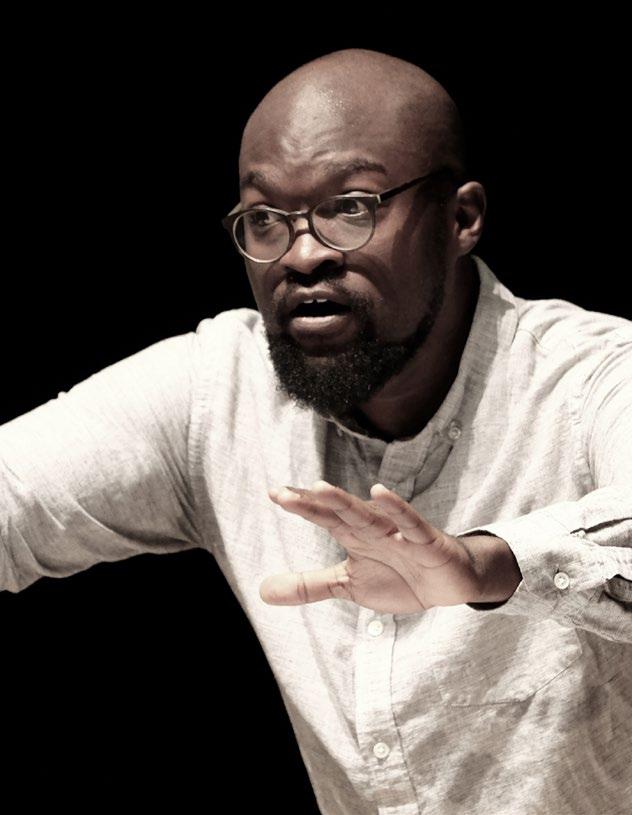
Pascale Florestal is a Boston-based director, dramaturge, educator, and writer who is dedicated to developing theatrical experiences that shed light on the narratives rarely seen on stage. She is also a Boston Conservatory alum, and she has found great joy both in working with fellow alums and in bringing that same awareness and experience to her students at the Conservatory. One of her most exciting recent projects was directing the widely acclaimed Once on This Island, a Caribbean retelling of the “Little Mermaid” fairytale. “I have never done a show that so uplifted my Haitian culture,” she says. “And to also work with so many Conservatory students and alums made it an incredible experience.” She also served as associate director for the national Broadway tour of Jagged Little Pill, of which she says: “Learning from Diane Paulus and the team was the best learning experience I could ask for.”
Florestal feels very fortunate to have a part-time schedule at the Conservatory because it allows her to continue her own creative work, including her role as education director and associate producer at Front Porch Arts Collective, a Boston-based community theater organization. It’s a juggling act she manages with calendars, lists, reminders, and the Notes iPhone app—professional skills she encourages in her students to help them prepare for a career in the professional world. “I remind my students to be in a versatile mindset,” she says, explaining how she encourages open-mindedness.
Pascale Florestal Assistant Professor of Theater
She adds, “The learning never stops, especially as the world continues to evolve and change. The work to be an artist looks different for each person, and there is not a right way to do what we do. As long as you are doing what you love, it will always be worth it.”
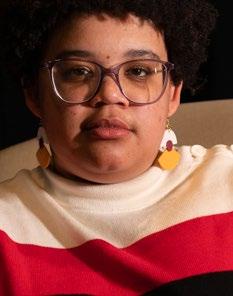
“As an artist, I’ve learned you have to constantly be adapting and learning.”
28 | STAGES
C. Robin Marcotte Assistant Professor of Theater
With an artistic provenance that has included intensive work in physical theater, puppetry, contemporary circus arts, and mime, Assistant Professor of Theater C. Robin Marcotte brings a finely tuned awareness of the body and creative wellness to his movement and ensemble performance classes at the Conservatory. His most recent work, The Anxiety Piece, which melds theater, dance, and comedy, was a collaboration with healthcare professionals across New England and with Articine, a nonprofit integrating the arts and medicine. Premiering in Portsmouth, New Hampshire, to wide acclaim, the work received a New Work New England Grant from the New England Foundation for the Arts. For Marcotte, it was an exciting opportunity to address the heightened levels of anxiety in society at large and in his students in particular.
“I frame my creative, teaching, wellness, and performing work as one artistic practice. They all serve each other,” he explains. An important part of this integrative teaching philosophy is to train actors to be true to themselves. “An easy access to truth is seated in wellness,” Marcotte says. “I resist the notion that an artist must be ‘troubled’ to create strong art. The world is full of so much trauma and fear; it’s my belief that artists can heal both themselves and others. I feel called to instill a high level of joy in my students’ rigorous artistic path.ˮ He adds:
“Artists need a high level of mental and physical health—resiliency and compassion for themselves—to dive deep into their art. Through my creative work and through teaching, I continue to search for new ways to lead my students down this path.”
Ramone Owens Assistant Professor of Theater
Ramone Owens, a Boston Conservatory alum, has enjoyed a successful career as a performer and a choreographer with many national and regional Broadway and offBroadway tours, including an ensemble role in the original company of Beetlejuice the Musical. More recently, for the past two years, he was part of the developmental process of the Broadway production of Some Like It Hot. “It’s exciting to see this show go from conception to production,” he says. “The music is great, the dancing is phenomenal, and there is new life in a show that has been known and loved for a while.”

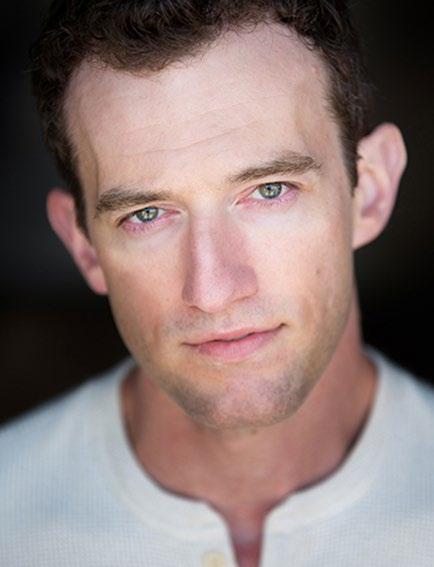
That new life and vitality is exactly what he’s bringing from the stage to the classroom at Boston Conservatory:
“As a teacher, I try to create an environment that parallels the pace, rigor, and joy that I have found in my performance career.”
He explains, “Hard work is paramount, and one must hold oneself accountable.” He continually challenges his students to take responsibility for their education accordingly. “In life, nothing will be handed to you,” says Owens. “Technique and hard work will sustain you. Take care of your body, stay in good practice, and always try to be better than you were the day before.”
bostonconservatory.berklee.edu | 29
SIGNALING CHANGE AT THE PODIUM

Alum
Jonathon Heyward makes history as Baltimore Symphony Orchestra’s first music director of color.
By Madison Spahn
OUTCOMES 30 | STAGES
Photos by Laura Thiesbrummel
Alum Jonathon Heyward (B.M. '14, cello) is no stranger to accolades. At 30, he leads the Nordwestdeutsche Philharmonie as chief conductor and has already made guest appearances with many of the most respected symphony orchestras in the world, including the London Symphony Orchestra and the Atlanta, Detroit, and San Diego symphony orchestras. In 2021, he made a wildly successful debut with the BBC Proms, where he was hailed as “coolly heading for the stratosphere.”
But it seems likely that Heyward’s greatest achievements are yet to come: in July 2022 the Baltimore Symphony Orchestra appointed him as its 13th music director, making him the first person of color to assume this role in the orchestra’s history. Additionally, when he begins his five-year term in 2023, he will be the youngest director of a major American symphony orchestra by more than 10 years.
Growing up in Charleston, South Carolina, Heyward began his classical music journey as a cellist, but he discovered an aptitude and love for the collaborative nature of conducting early on. As a cello student at Boston Conservatory, he studied with Professor of Cello Andrew Mark. Heyward explains, “[Mark] took me on despite knowing I wanted to be a conductor. He knew that I also really strove to be the best cellist I could, to learn about conducting from the orchestra.”
While completing his B.M. in cello at Boston Conservatory, Heyward also studied conducting under Andrew Altenbach, former associate professor of opera, who, Heyward notes, “essentially gave me my first job as assistant conductor to the Opera Department.” Altenbach attributes Heyward’s success to a strong work ethic and a passion for discovering music, recalling Heyward’s “total commitment” and “joyful urgency
to absorb as much as he could” while a student. “He took it to heart when he asked me how many hours he should be studying,” Altenbach explains. “I answered, ‘How many hours are you awake?’”
Heyward’s appointment with the Baltimore Symphony Orchestra is a meaningful moment for the classical music industry. “I hope it brings for the industry and beyond the concept that this art form is truly for all, no matter your race, religion, or socioeconomic background,” Heyward says. “This wonderful art form is for everyone.” As only the second Black conductor in history to lead a major symphony orchestra in the United States, his presence at the podium means a great deal for the visibility of people of color in the classical music industry, particularly in a city like Baltimore, where 62 percent of residents are Black.
As someone whose introduction to classical music occurred in the public school system, Heyward understands the value of educational outreach. He previously spent three years as music director of the Hallé Youth Orchestra in Manchester, England, and is particularly excited to continue the Baltimore Symphony’s work with OrchKids, a Baltimore public school system music program founded by his predecessor, Marin Alsop.
Eager to create new initiatives aimed at connecting the orchestra with its surrounding community, Heyward is especially keen to partner with communities traditionally underrepresented in classical music. As he told the New York Times, “If a 10-year-old boy from Charleston, South Carolina, with no music education background, with no musicians in the family, can be enamored and amazed by this, by the best art form there is— classical music—then I think anyone can. I plan on trying to prove that in many, many ways.”
bostonconservatory.berklee.edu | 31
FOR THIS THEATER MAKER, IT TAKES AN ENSEMBLE
Shanelle Chloe Villegas discusses Boston Conservatory’s contemporary theater faculty and the program’s emphasis on collective collaboration.
Alum Shanelle Chloe Villegas (B.F.A. '19, contemporary theater) has spent most of her life in Boston, where she has become prominent in the city’s vibrant theater scene and drawn critical acclaim with a spate of notable roles in productions such as BLKS, People, Places & Things, and School Girls; or, The African Mean Girls Play. In September 2022 she was featured in WBUR’s “The Makers: 15 artists of color leaving an imprint on Massachusetts.” Here, Villegas reflects on Boston Conservatory’s faculty and how the ensemble focus of the school’s contemporary theater program shaped her as a theater maker.

WHO ARE SOME OF THE KEY TEACHERS AND MENTORS THAT YOU WORKED WITH AT BOSTON CONSERVATORY? WHAT WERE SOME OF THE MOST IMPORTANT LESSONS YOU LEARNED FROM THEM?
It is hard to name just a few key teachers at Boston Conservatory because the entire theater faculty is out of this world. So many of my teachers had an instrumental role in shaping me into who I am as an artist and activist today.
From Chris Webb, a teacher I had for almost my entire college career, I learned about who I am as an individual and how to bring that into an ensemble. From Jennie Israel and Marya Lowry, I learned about and fell in love
with the depth of Shakespeare’s text. They introduced me to language that can hold every part of me, that can allow me to be fluid in vocal range, gender, and physicality. They taught me about my power as a performer and how to speak my truth.
Mark Krawczyk, Susan Thompson, Alli Ross, David Gammons, and Mauricio T. Salgado taught me about experimental theater. In their classes we were able to create outside the box, often playing with avant-garde texts, movement styles, visual art, a mix of solo, partner, group work, or applied theater. In these classes, I learned how to not only be an actor but a theater maker with a voice and a vision that can be applied to more than just the stage. From Summer Williams, Theresa Lang, and David Valdes, I learned about how to be an ethically wellrounded, thoughtful, and inclusive creative person—how to know your beliefs and stand firmly in them as an artist, to amplify and protect those that you care about being seen and heard.
IN YOUR EXPERIENCE, HOW DID THEIR WORK AS ACTIVE PERFORMERS AND ARTISTS PLAY INTO THEIR TEACHING?
All of my teachers at Boston Conservatory were multihyphenate artists working multiple jobs and juggling many
OUTCOMES 32 | STAGES
artistic projects while having families. To observe them going through this societal dance that artists are made to go through—successfully—gave me many examples of how I could live as an artist upon graduation. The fact that they all “walk the walk” allowed me to trust them when they “talked the talk.” In other words, nothing was theoretical with them because they all had lived experience in the theater industry. And although many of my teachers at Boston Conservatory have differing identities from mine (which inevitably shapes individual struggles or challenges in the theater industry), I was still able to relate to their stories about artistic failures and challenges and use them as a guide for what was to come for me.
YOU WERE PART OF THE CONSERVATORY’S FIRST GRADUATING CLASS OF THE CONTEMPORARY THEATER PROGRAM. HOW DID THIS PROGRAM AND ITS FACULTY HELP PREPARE YOU FOR YOUR CAREER?
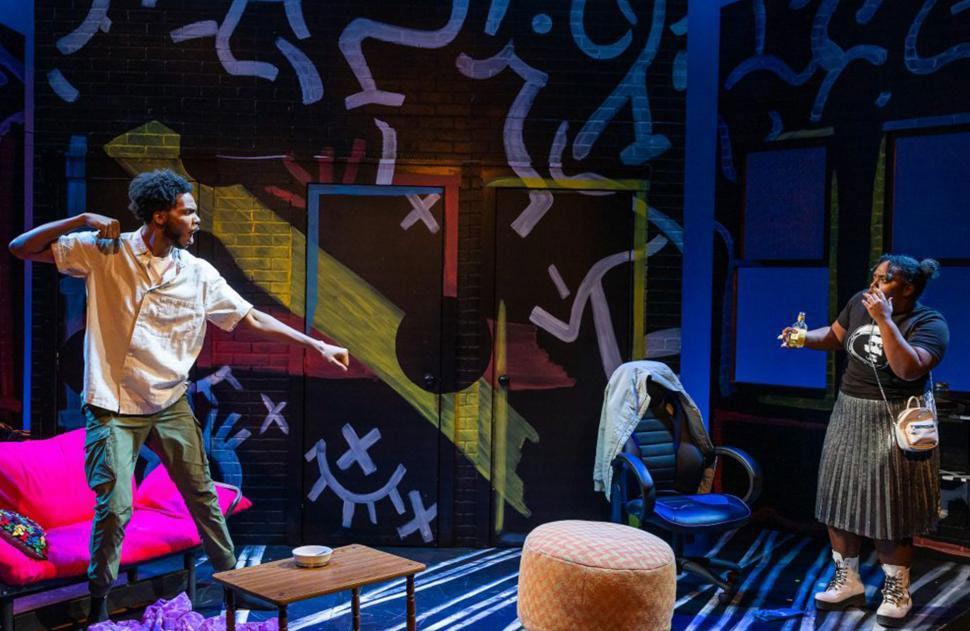
For us in this program, where we had to work with the same group members for four years in almost every class, our goals were twofold: we were focused not only on graduation and self-development but also on attempting to be an ensemble—a group of people working toward a common goal—on a daily basis.
So, at a very young age, all these young adults from wildly differing hometowns, social classes, ethnicities, and histories had their personal success intertwined with the success of the group. We constantly asked these big questions: How do we make decisions as a group? How is every voice heard and valued throughout the process? Who are we to each other, what are our roles within the group, and how and when do those roles shift? How can all these different people reach a common goal?
By asking these questions over and over again, some of our attempts at being an ensemble were successful. Some others, not so much. The times when we were successful were times when we had a vision open enough for all of us to fit inside of it, when grace replaced ego, when we all had authorship but could be fluid in our roles, and when we viewed each other as integral, not replaceable, to the vision and story.
From this experience, as an actor, educator, writer, and overall extrovert who is always in rooms with a wide array of individuals, I strive daily to reach this feeling with any group I ever work with. This program definitely gave me the foundational tools to show me how to work with a group in a democratic, non-hierarchical way and to value the voice of each person in the room. I think art is more beautiful, more memorable, when every artist has ownership—and in my career I aim to always connect with the ensemble before anything else happens.
YOU HAVE HAD A RICH AND DYNAMIC CAREER AS A THEATER ARTIST. WHAT ARE SOME OF YOUR PROUDEST PROFESSIONAL MOMENTS OR PROJECTS YOU’VE BEEN PARTICULARLY EXCITED ABOUT?
The projects I’ve been most proud and excited about were projects where I was really connected to the cast and we all just felt like a family. These shows include School Girls; or, The African Mean Girls Play and BLKS at SpeakEasy Stage Company as well as Classic Repertory Company, a Northeast tour of classical plays at New Repertory Theatre, and, most recently, a film project titled Being Human with Jagun Fly Productions. In all of these experiences, the ensemble and I took time throughout the process to do ensemble building, which allowed us to communicate more openly, problem solve, and ultimately trust and listen to each other on stage or on camera. I am super into astrology, and recently I had a reading of my astrological chart and the astrologer told me, “For any job you have and enjoy, your coworkers have to be your friends.” Basically, in all the productions named above, that’s how I felt.
to Villegas discuss her work on WBUR.
Listen
I learned how to not only be an actor but a theater maker with a voice and a vision that can be applied to more than just the stage.
bostonconservatory.berklee.edu | 33
Villegas performs with fellow contemporary theater alum Sharmarke Yusuf (B.F.A. '20) in SpeakEasy Stage Company's BLKS. Photo by Nile Scott Studios.
FROM THE VOICE STUDIO TO THE RECORDING BOOTH
Opera
Over the last year, alum Eric Ferring (M.M. '16, opera) has accelerated his ascent as one of opera’s rising stars. Following his Metropolitan Opera debut in the 2021–2022 season singing Pong in Turandot, the tenor appeared in 32 Met performances to wide acclaim. In November, he released his first solo album, No Choice But Love: Songs of the LGBTQ+ Community, which was produced by one of his Boston Conservatory teachers: Rebecca Folsom. Here, Ferring talks to STAGES about the album and the unique working dynamic he shares with Folsom, as well as what he’s looking forward to next in his career—including a debut with Paris Opera this spring.

WHAT INSPIRED THE CONCEPT FOR YOUR SOLO ALBUM DEBUT?
I’ve always believed that it’s important for artists to show audiences who they are as people. On the operatic stage, we don’t often get the opportunity to show who we are, since we’re often playing characters created hundreds of years ago. The concert stage or the recording studio, however, is fertile ground for personal exploration and discovery. As members of the LGBTQ+ community, my pianist Madeline and I always wanted to have our debut album speak to who we are as people in a sincere, meaningful way. There is so much hate and violence in our world and toward our community, whether it be assaults, shootings, or attacks on our rights to play sports or use the bathroom. It seems that, for as far as we have come in this century, there has also been a renewed effort to belittle
and a cheerleader. A good producer knows exactly what an artist needs at any given moment to create the best product possible. It’s also important, in my opinion, that a producer already know the artist—their vision, their sound, their way of communicating and accomplishing goals. I also knew that I wanted as much of our production team to be a part of the LGBTQ+ community as the artistic team was (I’m a gay man, my pianist is a bisexual woman, and every composer, and many poets as well, are a part
alum Eric Ferring talks about his debut solo album, produced by Boston Conservatory voice teacher
OUTCOMES 34 | STAGES
Rebecca Folsom.
of the LGBTQ+ community). We wanted to celebrate our community and its immense talents any way we could.

All of those desires said, I needed someone I trusted immensely. This is my debut album—it’s my baby! Rebecca Folsom has over the years played many roles to me. First it was professor and mentor, which then transformed into confidant, advocate, colleague, and dear friend. I knew she would be perfect in the role, and I couldn’t be prouder of the work we accomplished together and the remarkable album we created. Interestingly, I think our working dynamic is in many ways the same as it was when I was a student: one built on mutual respect and a fervent desire to learn, explore, and create. But now there’s an added layer, as I’ve grown into my artistic self, to be able to collaborate in profound ways to better each other—to push each other even if we didn’t know it was possible ourselves.
WHAT ARE SOME OF YOUR PROUDEST PROFESSIONAL MOMENTS? WHAT ARE YOU LOOKING FORWARD TO NEXT?
My proudest professional moments have all occurred in the last year: my Metropolitan Opera debut, which was followed by 32 more performances at the Met last season; my Santa Fe Opera debut this past summer as Fenton in Falstaff; and the release of my solo debut album. As a young singer, you always dream of singing at the Met and recording an album as something “real” singers do.

I’m truly blessed to have made these significant career milestones already, and I can’t wait to see what the future holds. I’m looking forward to this spring, when I will make my Paris Opera debut, and then in late 2023, I will release a chamber music album, We Have Tomorrow, with pianist Madeline Slettedahl and French string quartet Quatuor Agate.
More important than anything, however, is that I have been able to share all of these accomplishments with the many people along the way who have helped me achieve them: professors, family, friends, sponsors, and donors. There have been an incredible number of people who have allowed this small-town Iowa boy to realize his dreams on the biggest stages in the world—from buying me my first proper suit when I couldn’t afford it, to helping me pay my rent at my first young-artist program, to donating to help me create the beautiful album we just released, and more. I thank my lucky stars every day for these immense blessings, and I hope one day to pay back that generosity to others. Because, as my album title says, there’s no choice but love.
bostonconservatory.berklee.edu | 35
Listen to Ferring’s debut album, No Choice But Love.
THE MENTOR


Associate Professor of Dance Joy Davis takes on student career development


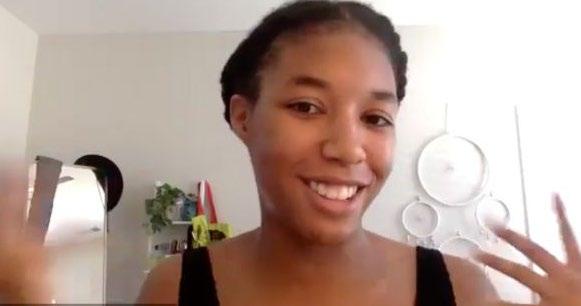


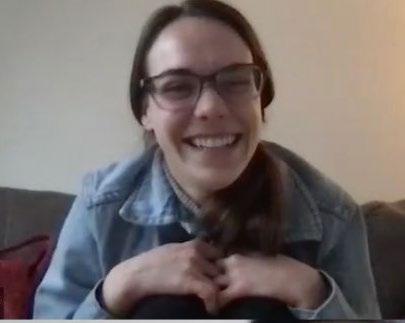

Boston Conservatory’s Dance Division has established forward-thinking programs that provide students with support and flexible pathways for building successful careers. In 2019, the division launched its wildly successful Professional Transition program, which allows fourth-year students in good academic standing to take on professional contracts for either one semester or their full senior year while graduating on time. Since the program’s launch, dance students have landed coveted positions with internationally renowned companies such as Nederlands Dans Theater, Complexions Contemporary Ballet, and many others.
Now the division is piloting Career Development and Mentorship for Dancers, a new initiative designed by Dean of Dance Tommy Neblett and Associate Professor of Dance Joy Davis that supports dancers’ individual artistic and career goals as they navigate a changing performing arts field by creating a bridge between undergraduate training and professional pursuits. As part of this effort, Davis is serving as a liaison to connect current dance students and recent alums with Alumni Affairs and the Berklee Career Center and the robust resources those offices provide.
Launched in fall 2021, Career Development and Mentorship for Dancers provides current students from their second year through two years after graduation with one-on-one and group mentoring focused on dance-specific careers, alumni networking opportunities, resource management advice, and other services that support vibrant careers in dance.
Photo above: Each week a dance alum gives an artist talk to share career insights with current students, strengthening their nextworks in the field. Featured speakers have included B.F.A. in contemporary dance alums Brittany Brown ('19), Maggie Costales ('18), Rachel Ferring ('17), Rosario Guillen ('20), India Hobbs ('21), Kevin Lau ('20), Paul Liu ('20), Tyeri Morrison ('21), Arthur Sicilia ('19), and others.
OUTCOMES 36 | STAGES
SUMMER PROGRAM REGISTRATION
BRASS WORKSHOP
(Joint program with Berklee College of Music)
June 20–24, 2023
A dynamic five-day program for brass players interested in exploring classical, jazz, or contemporary sounds with professional jazz performers and classical musicians.
HIGH SCHOOL COMPOSITION INTENSIVE July 17–29, 2023
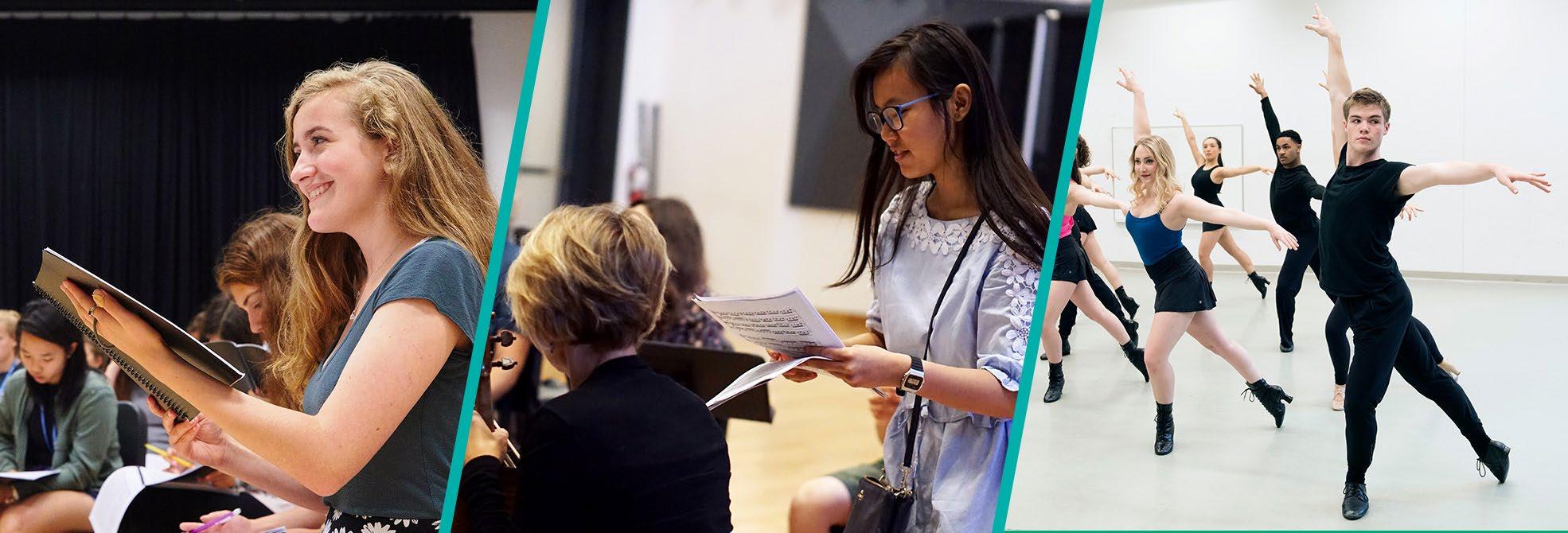
A one-of-a-kind program for young composers looking to learn the foundations of music composition and develop a professionally recorded portfolio of their original work.
VOCAL/CHORAL INTENSIVE June 26–July 8, 2023
An essential program for passionate classical and musical theater vocalists designed to strengthen singers' performance skills and build confidence in performance choices.
MUSICAL THEATER ACTING INTENSIVE July 10–29, 2023
An immersive intensive focused on character development, acting, singing, movement, and audition prep.
MUSICAL THEATER DANCE INTENSIVE June 20–July 9, 2023
A dance-focused musical theater program featuring rigorous courses in ballet, jazz, theater dance, musical theater voice, and stage acting.
YOUTH MUSICAL THEATER SUMMER PROGRAM July 31–August 4, 2023 | August 7–11, 2023
A one- or two-week experience for middle school students looking to explore musical theater and develop performance skills.
COMMERCIAL DANCE INTENSIVE July 10–29, 2023
A deep dive into dance creation for video, film, and live concerts, taught by dance professionals with extensive experience in the commercial dance industry.
SUMMER DANCE INTENSIVE July 24–August 12, 2023
A rigorous training rotation of contemporary ballet, modern dance, improvisation, and choreography that will inspire dancers to think differently about their art.
OPEN!
the program that’s right for you and register now to experience Boston Conservatory’s signature training firsthand. REGISTER ONLINE bostonconservatory.berklee.edu | 37
IS
Find
In the Limelight 1 2 3 4
1.
2.
S. Bach, November 2022.
3. Wendell Beavers, founder of the Experimental Theatre Wing (ETW) at NYU Tisch School of the Arts, gave a workshop on the Six Viewpoints, a technique for performing arts training he developed with originator Mary Overlie, October 2022.



 Boston Conservatory Interim Executive Director Lucinda Carver chats with legendary artist Joni Mitchell, who received an honorary doctorate from Berklee College of Music at a ceremony in Los Angeles, August 2022.
Bassist Xavier Foley gave a master class ahead of his String Masters Series performance, in which he performed his original compositions and works by J.
4. Choreographer Jesse Obremski (top row, center) gave a master class for senior contemporary dance majors, October 2022.
Boston Conservatory Interim Executive Director Lucinda Carver chats with legendary artist Joni Mitchell, who received an honorary doctorate from Berklee College of Music at a ceremony in Los Angeles, August 2022.
Bassist Xavier Foley gave a master class ahead of his String Masters Series performance, in which he performed his original compositions and works by J.
4. Choreographer Jesse Obremski (top row, center) gave a master class for senior contemporary dance majors, October 2022.
38 | STAGES
5. Berklee President Erica Muhl, choreographer Jennifer Archibald, Boston Conservatory Interim Executive Director Lucinda Carver, Boston Conservatory Dean of Dance Tommy Neblett, and CJ Cultural Foundation Executive Vice President Jo Min attended the KCON Los Angeles convention, where 13 Conservatory dance students performed Archibald’s work KCON, which was generously supported by the CJ Cultural Foundation, August 2022.
7.
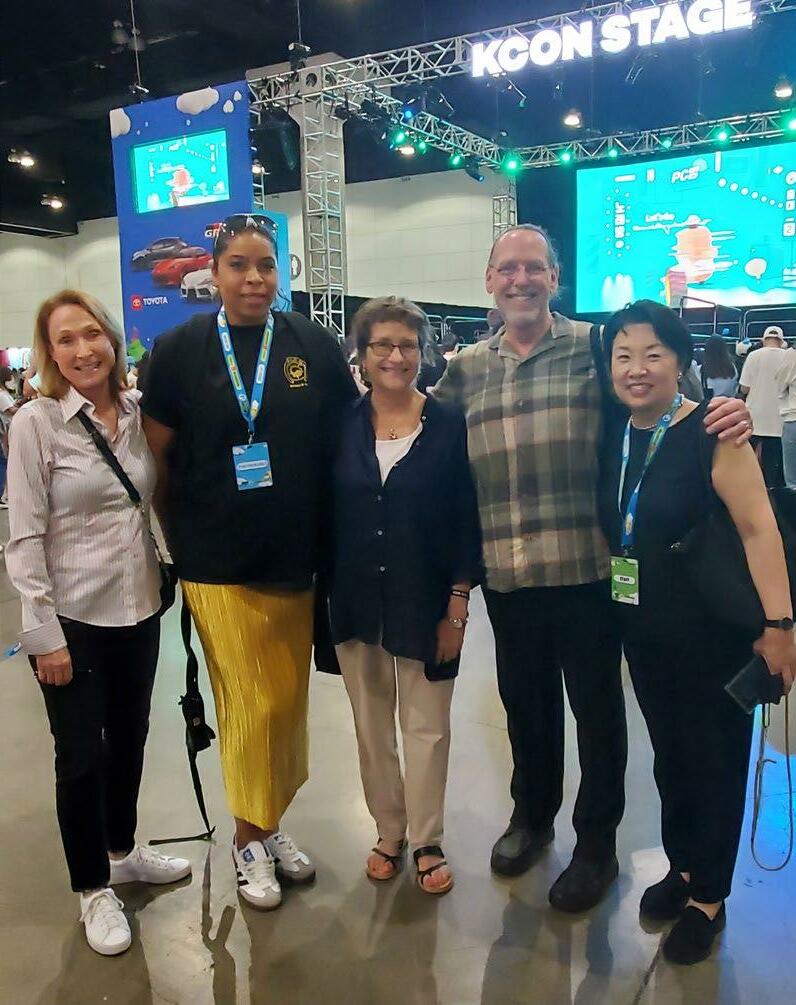
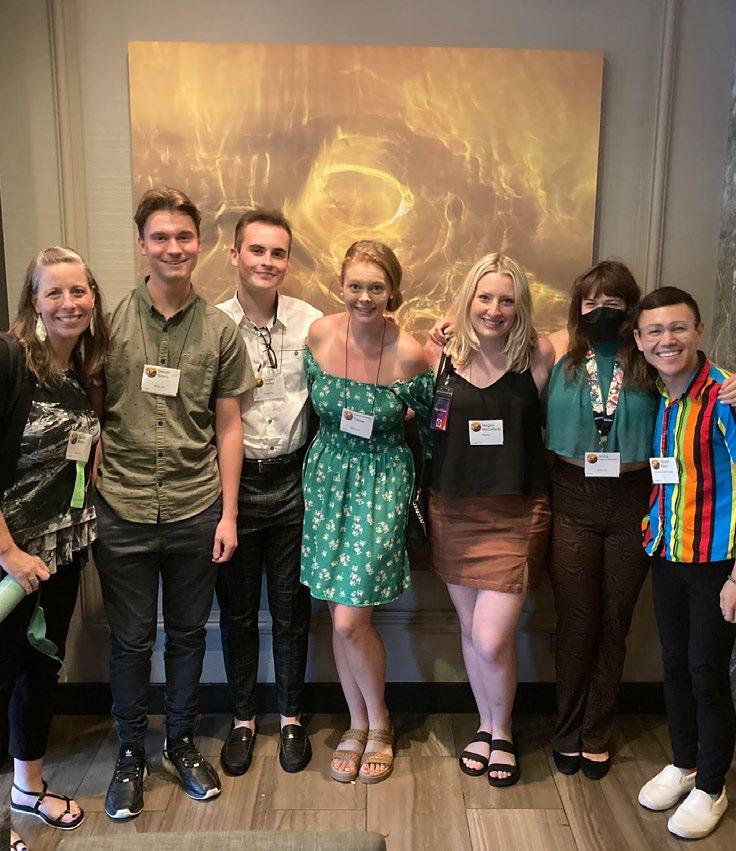

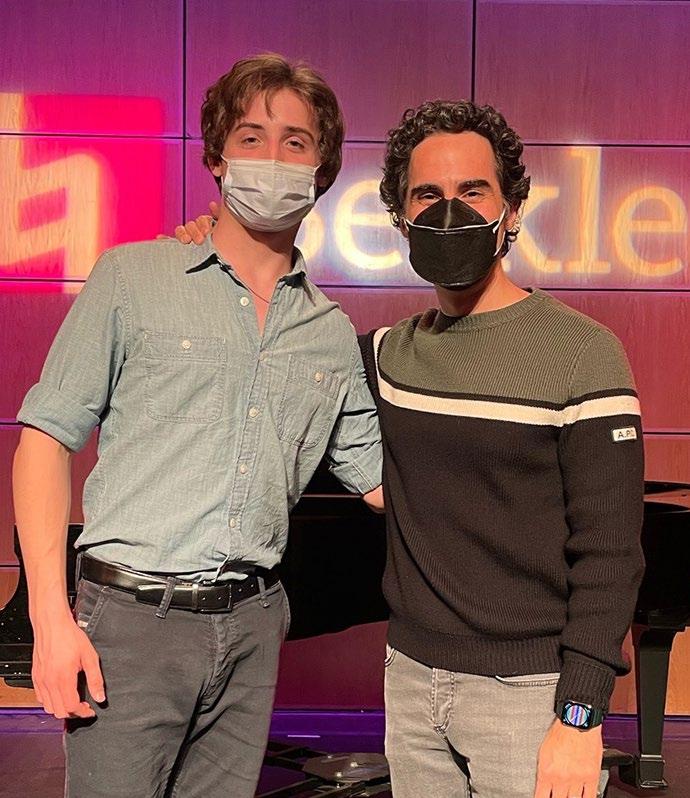
9.
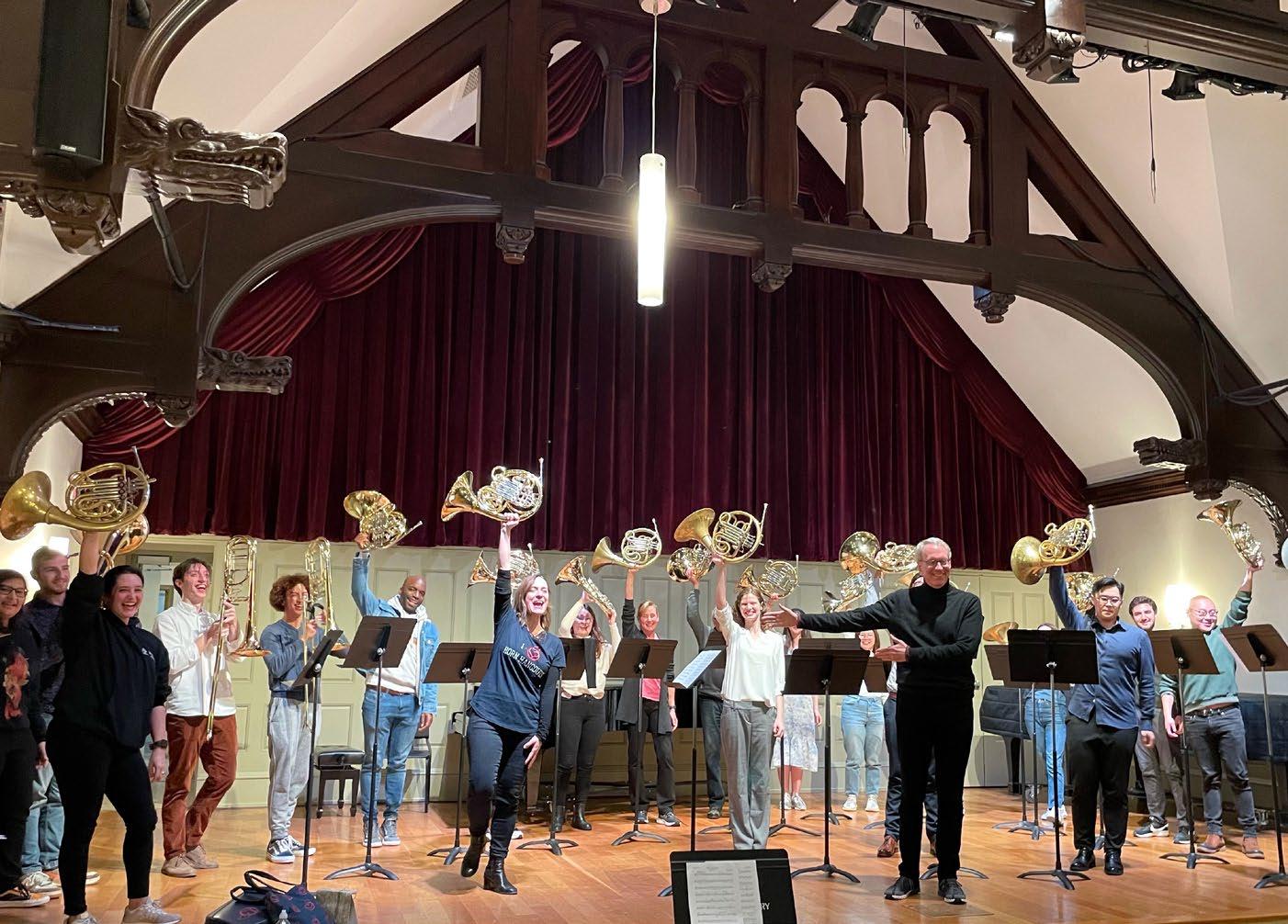
6 7 8 9
6. Brass Performance Seminar, led by professor Larry Isaacson, welcomed a full house for special guest artist-clinician Sarah Willis of the Berlin Philharmonic Orchestra, November 2022.
Boston Conservatory theater students enjoyed a series of master classes with celebrated orchestrator and Berklee College of Music alum and honorary degree recipient Alex Lacamoire '95, who met with Wyatt Anton (B.F.A. '25, musical theater), recipient of the Alex Lacamoire Scholarship, March 2022.
8. Internationally recognized choreographer Lesley Telford gave a master class to contemporary dance students as part of their Modern Technique class, November 2022.
5 bostonconservatory.berklee.edu | 39
Associate Professor of Flute and Contemporary Music Sarah Brady was joined by flute students and alums Devyn Sowry (B.M. '24), Logan Haley (B.M. '24), Hannah Elizabeth Tobias (M.M. '23), Megan McCafferty (B.M. '23), Anna Fisher-Roberts (M.M. '23), and Donald Rabin (M.M. '21) at the National Flute Association Convention in Chicago, August 2022.
NOTEWORTHY
CURRENT STUDENTS FACULTY/STAFF
Kurt Douglas (dance) created new choreographies for the Kinder High School for the Performing and Visual Arts (Houston) and the San Diego School of Creative and Performing Arts.
Marissa Parmenter (dance) was director of dance education of Festival Ballet Providence, where she restaged The Nutcracker at Veterans Memorial Auditorium for their children’s cast of 100 young dancers, December 2022.
Katie Piselli (dance) competed in the All-Star Solo Jazz division at the International Lindy Hop Championships and was the only USA finalist, July 2022.
Jessica Chow Shinn and YaoGuang Zhai (music) celebrated the Lunar New Year with a performance of Mu Ge, by Chinese composer Shan Han Kun, February 2022.

Nancy Zeltsman was inducted into the Percussive Arts Society’s Hall of Fame, November 2022.
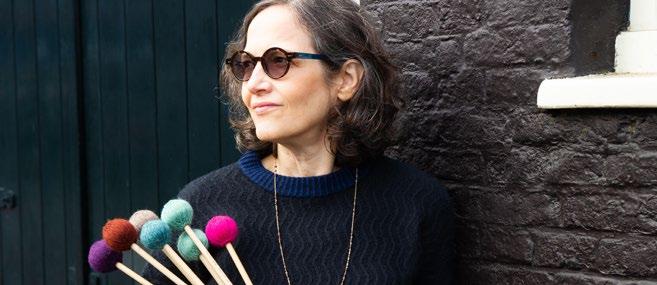
Jermaine Hill (theater) was the music director and arranger for Academy Award winner Tarell Alvin McCraney’s Choir Boy at the famed Steppenwolf Theatre Company in Chicago. Hill also music directed and served as conductor/ pianist for The Color Purple at The MUNY in St. Louis (June 2022), and in September, he was the music consultant for Joe Turner’s Come and Gone, the first show presented by Boston’s Huntington Theatre Company since the pandemic.
Dennis Trainor Jr. (theater) performed in the Actors’ Shakespeare Project’s production of Let the Right One In, October 2022.
Angela Farr Schiller (theater) was the dramaturge for MacArthur Fellow Dominique Morisseau’s play Confederates for its West Coast debut at the Oregon Shakespeare Festival, May 2022.
DANCE
Somer February and Christian Gonzalez (both B.F.A. '23, contemporary dance) performed Chair of Dance Mila Thigpen’s choreography as a tribute to Duke Ellington and Carmen de Lavallade’s collaboration on A Drum Is a Woman, September 2022.
Chris Mitchell (B.F.A. '22, contemporary dance) was a principal dancer in the movie Hocus Pocus 2 (released September 2022), filming alongside stars Bette Middler, Sarah Jessica Parker, and Kathy Najimy.

MUSIC
Nina Anderson (M.M. '23, opera) presented at the 25th Anniversary African American Art Song Alliance Conference hosted at the University of California, Irvine, in October 2022, where she performed Robert Owens’s song cycle Heart on the Wall. The Alliance was founded to disseminate information on music by Black composers, as well as the performers and scholars promoting these works. Anderson is a student of Rebecca Folsom.
Marianna Bassham (theater) directed Heroes of the Fourth Coming at SpeakEasy Stage Company, September 2022.
Paul Daigneault (theater) directed The Inheritance at SpeakEasy Stage Company. The production featured faculty member Dennis Trainor Jr. and Boston Conservatory theater students Luke Sabracos, Sam Griffin, Isaac Tardy, Kees Hoekendijk, and Ian Viciedo, April 2022.
Larry Sousa (theater) was the choreographer for Matilda, the Musical at Wheelock Family Theatre, October 2022.
Matt Stern (theater) was the associate music director for Sing Street at the Calderwood Pavilion, September 2022.
Christopher Humbert Jr. (M.M. '23, opera) will join the Patrick G. and Shirley W. Ryan Opera Center Ensemble for their 2023–2024 season, winning a coveted spot in the organization’s prestigious young artist program, September 2022. Humbert is a student of Rebecca Folsom.
Callie Meikrantz (M.M. '23, voice) won third prize in the MassOpera Vocal Competition, October 2022. Meikrantz is a student of Kerry Deal.
Rose Van Dyne (M.F.A. '24, vocal pedagogy) made her Broadway debut in the musical 1776 and went on to perform the role of Samuel Chase in Roundabout Theatre’s Broadway revival production of 1776, October 2022.
Nancy Zeltsman
40 | STAGES
Jermaine Hill
Boston Conservatory at Berklee was well represented in Reagle Music Theatre’s summer production of West Side Story. The cast was made up of nearly 20 current theater students and alumni, including the roles of Tony and Maria, played by Blake Du Bois (B.F.A. '21) and Eevie Perez (B.F.A. '24), respectively. The production was directed and choreographed by Reagle Music Theatre’s recently appointed artistic director, Rachel Bertone, a 2007 graduate with a B.F.A. in contemporary dance and a former musical theater faculty member. Boston Conservatory dance faculty member Dustienne Miller served as co-assistant choreographer.
ALUMNI
THEATER
Karina Gonzalez (B.F.A. '25, musical theater) received the Chita Rivera Scholarship Award, which is given to an outstanding student who demonstrates exceptional potential, May 2022.
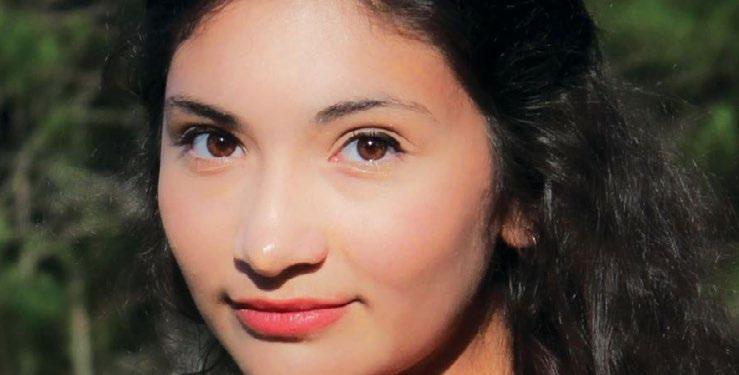
1980s
Eddie Korbich (B.F.A. '83, musical theater) performed at the Tony Awards in The Music Man, June 2022.
1990s
Andrea Buchanan (B.F.A. '92, piano) published her debut novel, Five-Part Invention (Pegasus Books), June 2022.

Rachel Bertone (B.F.A. '07, contemporary dance) was appointed artistic director of the Reagle Music Theatre of Greater Boston, February 2022.
Vanessa Isiguen (M.M. '07, opera) made her Metropolitan Opera debut covering the dual role of Kitty/Vanessa in the world premiere of The Hours by composer Kevin Puts and librettist Greg Pierce, conducted by Yannick Nézet-Séguin.
Ana Nogueira (B.F.A. '07, musical theater) was interviewed by ForbesWomen about her career writing for stage and screen and her original show Which Way to the Stage, May 2022.
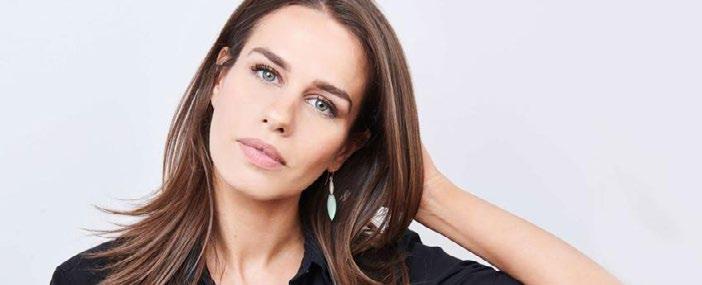
Jordan Hall (B.F.A. '25, musical theater) will appear in the 2023 Amazon Prime movie The Idea of You with Anne Hathaway, produced by Gabrielle Union and directed by Michael Showalter, October 2022.
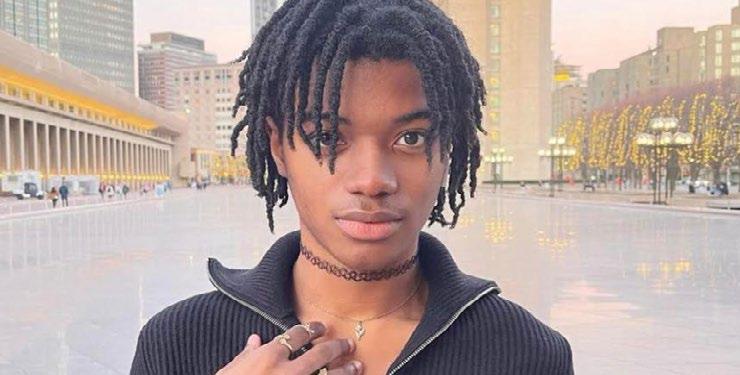
Jayden Nelson (B.F.A. '25, musical theater) received the André De Shields Scholarship Award, given to an outstanding musical theater student who demonstrates exceptional potential, May 2022.
Jennifer Simard (B.F.A. '92, musical theater) was nominated for a Tony Award for Best Performance by an Actress in a Featured Role in a Musical for her performance as Sarah in Company, May 2022.

Sangeeta Kaur (M.M. '08, voice) received a Grammy Award in the Best Classical Solo Vocal Album category for her performance on the album Mythologies, April 2022.
Rukmini Vijayakumar (B.F.A. '08, contemporary dance) has published two books, Finding Shiva and Discovering Devi.
2000s
Sophia Takla (B.F.A. '23, musical theater) was crowned Miss Oregon and represented the state at the Miss America pageant, June 2022.
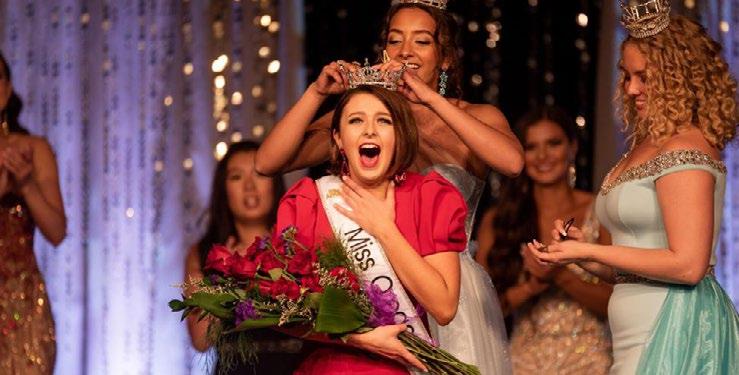
Alysha Umphress (B.F.A. '04) was in the cast of Mr. Saturday Night, which received a Grammy nomination for Best Musical Theater Album, November 2022.
Ebony Williams (B.F.A. '05) was featured in the Boston Globe multimedia series A Beautiful Resistance, celebrating Black joy and Black lives, December 2022.
Margretta Beaty (M.M. '06, voice) won the 2022 MassOpera Vocal Competition, October 2022.
Sir Brock Warren (B.F.A. '08, contemporary dance) performed at the Tony Awards in Paradise Square, June 2022.
2010s
Russell Ger (M.M. '10, orchestral conducting) was appointed artistic director of Orchestra 914, March 2022.
Joe González (B.F.A. '10, contemporary dance) joined Complexions Contemporary Ballet, August 2022.
Karina Gonzalez
Jayden
Nelson
Jennifer Simard
Andrea Buchanan
Ana Nogueira
Sophia Takla
bostonconservatory.berklee.edu | 41
John Batchelder (B.M. '12, G.P.D. '14, viola) was named the new executive director of the Dallas Chamber Music Society, February 2022.
Eric Ferring (M.M. '16, opera) released his debut solo album, No Choice But Love: Songs of the LGBTQ+ Community, which highlights diverse LGBTQ+ voices and perspectives. On this double album, Ferring joined forces with pianist Madeline Slettedahl, and Boston Conservatory faculty member Rebecca Folsom served as producer, November 2022.
Shoba Narayan (B.F.A. '12, musical theater) committed to bringing her culture as a South Asian woman to her performance of Princess Jasmine in Aladdin the Musical, January 2022.

Marquis Floyd (B.F.A. '17, contemporary dance) joined the national tour of The Lion King in the dance ensemble.
Renni Magee (B.F.A. '17, musical theater) performed at the Tony Awards in MJ: The Musical, June 2022. The cast album for MJ: The Musical also received a Grammy Award nomination for Best Musical Theater Album, November 2022.
Francesca Mehrotra (M.M. '21, opera) is in residence with Opera Colorado for their 2022–2023 season, August 2022.
Chris Olsen (B.F.A. '21, musical theater) was interviewed by Observer about his rise to prominence and how TikTok went from fun quarantine activity to full-time job, May 2022.
Marchánt Davis (B.F.A. '13, musical theater) appeared in the Broadway debut of Ain’t No Mo’. He and the show transferred to Broadway after a highly successful run at the Public Theater, November 2022.
Bradley Gibson (B.F.A. '13, musical theater) was featured in the title role of the Paper Mill Playhouse production of Hercules after performing in Broadway’s The Lion King and A Bronx Tale: The Musical, October 2022.
Vanessa Becerra (M.M. '14, voice) played Juliet in Boston Lyric Opera’s production of Romeo & Juliet, July 2022.
Jonathon Heyward (B.F.A. '14, cello) was appointed music director of the Baltimore Symphony Orchestra, July 2022.

Melanie Bacaling (M.M. '15, voice) directed a docuseries The Butterfly Process: B, which explores Boston Lyric Opera’s production of Puccini’s Madama Butterfly through the lens of the originally cast singers and artists in conversation, interviews, and performance, May 2022.
John Cardoza (B.F.A. '16, musical theater) performed as Daniel LaRusso in the world premiere of The Karate Kid – The Musical, March 2022.

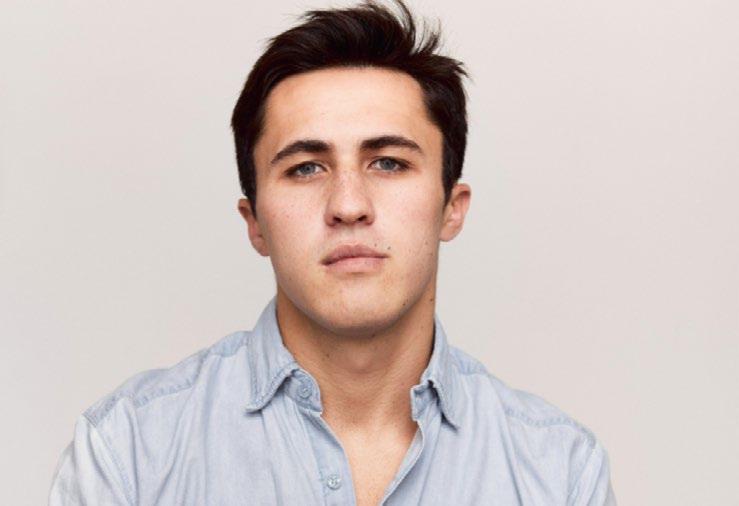
Elijah Daniel Smith’s (B.M. '17, composition) original work Wraith Weight was performed by the New England Philharmonic after he won the organization’s call for new compositions, September 2022.
Eleri Ward (B.F.A. '17, musical theater) joined Josh Groban as a special guest on his 2022 Harmony Tour, February 2022. Ward was also featured in the New York Times for her album Keep a Tender Distance, her second release of songs by Stephen Sondheim reimagined with indie-folk arrangements, September 2022.
Megan Callahan (M.M. '18, opera) sang the title role of Dido in Palm Beach Opera’s 60th anniversary season performance of Dido and Aeneas, December 2021.
Lilly Rose Valore (B.F.A. '19, contemporary dance) and Shanelle Chloe Villegas (B.F.A. '19, contemporary theater) were among the artists featured in the the WBUR series "The Makers: 15 artists of color leaving an imprint on Massachusetts," September 2022.
2020s
Xiaohui (Jason) Chen (B.M. '21, percussion) won third prize in the 2022 TROMP International Percussion Competition held in Eindhoven, The Netherlands. In addition, Chen received the Willem Vos Award for the best rendition of a solo marimba composition by a Dutch composer in the second round.
Lily Chrones (B.F.A. '21, contemporary theater) founded the Euphoria Theatre Company, whose debut work, The Destination of This Train Is (A Brief Inquiry into Online Relationships), was written by Connor Wentworth (B.F.A. '21, contemporary theater), August 2022.
Eun Joo Ahn (P.S.C. '22, violin) made their Carnegie Hall solo debut in Weill Recital Hall, February 2022.
Francesca Coverini (B.M. '22, voice) and Abraham Cruz (B.M. '22, voice), students of Marilyn Bulli, were among the top five winners of the summer 2022 Classical Singer Vocal Competition in the University Division, June 2022.
Sophia Formella (M.M. '22, opera) is a teaching artist for both the Metropolitan Opera and the Houston Grand Opera this season.
Christina Jones (B.F.A. '22, musical theater) performed in Central Square Theater' s production of Ain’t Misbehavin’, May 2022.
Winona Martin (M.M. '22, opera) was named artist in residence with Utah Opera for their 2022–2023 season, April 2022.
Peli Naomi Woods (B.F.A. '22, musical theater) performed as Ti Moune in SpeakEasy Stage Company’s production of Once on This Island, March 2022.
John Batchelder
Chris Olsen
Soba
Narayan
42 | STAGES
John Cardoza
LEADERSHIP
BOARD OF TRUSTEES
Erica Muhl, President, Berklee
Martin J. Mannion, Chair
Jeff Shames, Chair Emeritus
Susan Whitehead, Chair Emerita
G. Leonard Baker Jr.
David Clem
John Connaughton
Cynthia K. Curme^
Emilio Estefan
Gloria Estefan
Francesca Frederick '16
David Gross-Loh
Josh Gruss '97
Thomas M. Hagerty
Charles Hirschhorn
Steven Holtzman
Velina Hasu Houston
Bill Kaiser
Grace Kelly
Miky Lee (Mie Kyung Lee)
Hassell McClellan
Jane L. Mendillo
Frederick T. Miller^
Pete Muller
Robert S. Murley
Anthony Pangaro^
Jon Platt
Snow Qin^
Alex Rigopulos
Steve Ruchefsky
David Scott Sloan^
Darius Sidebotham^
HONOR A LEGACY, SECURE A FUTURE.
Susan Solomont
Beth Carrillo Thomas '10
Paul D. Wachter
Tarik Ward Andy Youniss
Marillyn Zacharis^
BOSTON CONSERVATORY AT BERKLEE EXECUTIVE DIRECTOR’S ADVISORY COUNCIL
Teresa Koster, Chair
Anne N. Cuervo, Vice Chair
Howard H. Bengele, Ph.D.
Elizabeth S. Boveroux
Frederic D. Carter, III
Davi-Ellen Chabner
Caroline McMillan Collings
Diana Dohrmann '71
Miles A. Fish, III '63
Kate Sides Flather
John S. Foster
Jennifer A. Fraser
Mimi Hewlett
Sophie Kornowski
B. J. Krintzman
Laura D. Kunkemueller
Ricardo Lewitus, M.D.
Michele Manganaro
Dr. Lyle J. Micheli
Brendan Murphy
Christopher D. Perry
Philip J. Poinelli
Xiaohang Quan
Too often, talented students have to abandon their dreams because they can’t afford to complete their education. Imagine if we could keep them in school by helping to close that financial gap—it would be truly life changing.
Late Boston Conservatory President Richard Ortner believed that a quality performing arts education should be accessible to any deserving student. Honor his legacy and secure a student’s future by supporting the Richard Ortner Thrive Scholarship. Your gift—of any amount—ensures that promising Conservatory students have the means to graduate and pursue their dreams.

Wanda Reindorf
Geraldine R. Ricci
Anthony Richardson
Warren A. Seamans
Tricia Swift
Ann Connolly Tolkoff
Rosamond B. Vaule
Peter J. Wender
Amy K. Wertheim
Edward G. Wertheim
Tania Zouikin
BOSTON CONSERVATORY AT BERKLEE LEADERSHIP
Lucinda Carver, Interim Executive Director
Kimberly Haack, Chief of Staff
Andy Vores, Vice President of Academic Affairs/ Chief Academic Officer
Tommy Neblett, Dean of Dance
Michael Shinn, Dean of Music
Jermaine Hill, Interim Dean of Theater
Emmett G. Price III, Dean of Africana Studies, Berklee
^ Legacy Conservatory Trustees
List as of December 2022
bostonconservatory.berklee.edu | 43

 Lucinda Carver Interim Executive Director Boston Conservatory at Berklee
Lucinda Carver Interim Executive Director Boston Conservatory at Berklee








 Thirteen Conservatory dance students performed at KCON Los Angeles, the world’s largest convention for Korean culture and music, at the Crypto.com Arena, opening for K-pop headliners ATEEZ, ENHYPEN, INI, and others, August 2022.
Boston Conservatory Orchestra performed works by William Grant Still, Tan Dun, and Gustav Mahler at Mechanics Hall in Worcester, Massachusetts, October 2022.
Thirteen Conservatory dance students performed at KCON Los Angeles, the world’s largest convention for Korean culture and music, at the Crypto.com Arena, opening for K-pop headliners ATEEZ, ENHYPEN, INI, and others, August 2022.
Boston Conservatory Orchestra performed works by William Grant Still, Tan Dun, and Gustav Mahler at Mechanics Hall in Worcester, Massachusetts, October 2022.





 Theater students performed Swing!, featuring classic and contemporary arrangements of some of the most well-known songs from the jazz era, at Calderwood Pavilion at Boston Center for the Arts, December 2022.
Opera students presented the award-winning opera Susannah, December 2022.
Boston Conservatory chorus and orchestra welcomed Met Opera soprano and guest soloist Karen Slack for the New England premiere of Florence Price's Song of Hope, held at Boston’s Old South Church, December 2022.
Dance students perform in the Conservatory’s Fall Dance Concert: From the Ground Up, November 2022.
Boston Conservatory at Berklee's contemporary music ensemble, contraBAND, performed minimalist works by Philip Glass, November 2022.
Theater students performed Swing!, featuring classic and contemporary arrangements of some of the most well-known songs from the jazz era, at Calderwood Pavilion at Boston Center for the Arts, December 2022.
Opera students presented the award-winning opera Susannah, December 2022.
Boston Conservatory chorus and orchestra welcomed Met Opera soprano and guest soloist Karen Slack for the New England premiere of Florence Price's Song of Hope, held at Boston’s Old South Church, December 2022.
Dance students perform in the Conservatory’s Fall Dance Concert: From the Ground Up, November 2022.
Boston Conservatory at Berklee's contemporary music ensemble, contraBAND, performed minimalist works by Philip Glass, November 2022.














 By Kara Baskin
By Kara Baskin

 Photos by Max Wagenblass
Photos by Max Wagenblass



 By Amanda Wicks
By Amanda Wicks







 Margaret Bonds performs Florence Price’s Piano Concerto in One Movement with the Chicago Women’s Orchestra, 1934.
Margaret Bonds performs Florence Price’s Piano Concerto in One Movement with the Chicago Women’s Orchestra, 1934.




























 Boston Conservatory Interim Executive Director Lucinda Carver chats with legendary artist Joni Mitchell, who received an honorary doctorate from Berklee College of Music at a ceremony in Los Angeles, August 2022.
Bassist Xavier Foley gave a master class ahead of his String Masters Series performance, in which he performed his original compositions and works by J.
4. Choreographer Jesse Obremski (top row, center) gave a master class for senior contemporary dance majors, October 2022.
Boston Conservatory Interim Executive Director Lucinda Carver chats with legendary artist Joni Mitchell, who received an honorary doctorate from Berklee College of Music at a ceremony in Los Angeles, August 2022.
Bassist Xavier Foley gave a master class ahead of his String Masters Series performance, in which he performed his original compositions and works by J.
4. Choreographer Jesse Obremski (top row, center) gave a master class for senior contemporary dance majors, October 2022.

















